They Didn’t Teach Me THAT in Law School
An Associate’s Reflections After One Year in Practice
BY JOHN D. BOONE, MAPLES | JONES, PLLC
Time and time again, during my first year in the practice of law, I have caught myself saying some variation of the following phrase: “Well, they didn’t teach me that in law school.”
Now, this article is not to bash law schools, or the law school experience generally, but I think it fair to say that even the best law school cannot fully prepare someone for the practice of law. After all, working as an attorney is a practice, and while the academic study of the law is essential to a successful career, it is no substitute for handson experience. So, in no particular order, here are a few things I have learned in my first year of practice that they most definitely did not teach me in law school.
1. Clients exist, and they have feelings too.
In law school, clients were rarely mentioned, and if they were it was as largely passive observers in the judicial process. In reality, the client most definitely exists! And they have strong feelings about the judicial proceeding and the direction their attorney is taking in that proceeding. Now, of course, there are all different types of clients out
there, and admittedly my perspective is a bit skewed by being a family law attorney, where the clients have an intensely personal interest in the lawsuit and its outcome. But corporate clients and governmental agencies certainly also have vested interests in any judicial proceeding (or potential judicial proceeding), and corporate and
governmental clients deserve to be just as informed regarding the status of their case as any individual.
The most important thing I have learned over the past year when it comes to client relations is to keep the client consistently informed regarding major events in their case and to manage the client’s expectations. Most clients are relatively uninformed about the law—or, worse, consider themselves to be extremely well informed because of last night’s Law and Order episode. In either case, the client likely has significant anxiety about the lawsuit. I have found that client anxiety levels significantly decrease if clients are educated about the law and how the law applies to their situation.
A simple email or brief phone call explaining what is happening in a client’s case, and what is likely to happen, goes a long way toward building a healthy and productive attorney-client relationship.

Set expectations. Many clients expect their lawyer to swoop in like Superman (or Superwoman) and solve all their problems in one heroic leap. But of course the law cannot, and should not, solve everyone’s problems. Having a frank discussion with clients about what the law can realistically achieve goes a long way toward managing expectations and building clients’ trust in their attorney.
continued on page 26
austinbar.org MAY 2023 | VOLUME 32, NUMBER 4








Get started at lawpay.com/austinbar 866-730-4140 TOTAL: $1,500.00 New Case Reference **** **** **** 9995 *** Trust Payment IOLTA Deposit YOUR FIRM L OGO HERE PAY AT TO RNEY PO WE R ED BY 22% increase in cash flow with online payments Vetted and approved by all 50 state bars, 70+ local and specialty bars, the ABA, and the ALA 62% of bills sent online are paid in 24 hours Data based on an average of firm accounts receivables increases using online billing solutions. LawPay is a registered agent of Synovus Bank, Columbus, GA., and Fifth Third Bank, N.A., Cincinnati, OH. Trusted by 50,000 law firms, LawPay is a simple, secure solution that allows you to easily accept credit and eCheck payments online, in person, or through your favorite practice management tools.
LawPay!
–Law
+ Member Benefit Provider
I love
I’m not sure why I waited so long to get it set up.
Firm in Ohio
FEATURED ARTICLES
1 They Didn’t Teach Me THAT in Law School
19 Look What’s Happening at Austin Bar Association’s Loving It Lawyers Club!
20 Local Inn of Court Chapters Accepting Applications
21 Travis County Civil District Courts 2024 Schedule

22 Austin Bar Celebrates 2023 Law Day Contest Winners
24 Austin Bar Starts Podcast on Diversity, Equity, Inclusion
25 Fifth Circuit Adopts Rule Change
26 Meet Austin Lawyer’s New Managing Editor, Billy Huntsman

IN

NEWS & ANNOUNCEMENTS
Veterans Legal Assistance Program Seeks Volunteers
The Austin Bar’s Veterans Legal Assistance Program invites you to volunteer your time and skills to help veterans and their families! Please consider providing free legal advice at one of our monthly veterans clinics or providing pro bono representation! For more information, please visit austinbar.org
17
18
DEPARTMENTS
6
12
UPCOMING EVENTS
MAY 16 Judge Yeakel Retirement Party
UT Club, 5 p.m. For more information and to RSVP, please visit austinbar.org.
CONNECTIONS ONLINE austinbar.org.
EMAIL billy@austinbar.org
MAIL Austin Bar Association 712 W. 16th Street Austin, TX 78701
SOCIAL
LIKE facebook.com/austinbar FOLLOW twitter.com/theaustinbar

WATCH vimeo.com/austinbar
STREAM @AustinBarAssociation
FOLLOW instagram.com/theaustinbar



TEXT austinbar to 313131 for up-to-date news + info Message & data rates may apply.

CONTENTS
AL AL RISK-TAKING CAN BE FUN... …BUT NOT WHEN IT’S A MALPRACTICE CLAIM. Family Law Claim* • Lawyer sued for losing a child custody case due to alleged inadequate discovery and representation at trial • Damages of up to $500,000 alleged • TLIE successfully defended lawyer at trial INSURED BY TLIE IF NOT INSURED Total out-of-pocket = $0 Defense costs $67,000 Settlement + $0 Total out-of-pocket = $67,000 * Based on actual claim handled by TLIE. FIND OUT MORE: TLIE.ORG or (512) 480-9074 MAY 2023 | VOLUME 32, NUMBER 4 MAY 2023 | AUSTINLAWYER 3
INSID E austinbar.org ONLINE AU ST INL AW Y ER
President’s Column
Opening Statement
EVERY ISSUE
Be Well
Briefs
AYLA
Federal Civil Court Update
8
10
14
16
Third Court of
Civil Update
Appeals
Third Court of
Update
Appeals Criminal
AUST INL AW Y ER AL AL
OFFICIAL PUBLICATION OF THE AUSTIN BAR ASSOCIATION

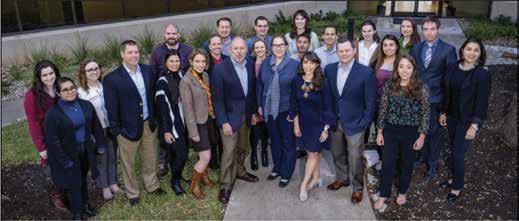
AUSTIN BAR ASSOCIATION
Amanda Arriaga President
Justice Chari Kelly President-Elect
Mary-Ellen King Secretary
Maitreya Tomlinson Treasurer
David Courreges Immediate Past President
AUSTIN YOUNG LAWYERS ASSOCIATION
Blair Leake President
Sarah Harp President-Elect
Emily Morris Treasurer
Ciara Parks Secretary
Rachael K. Jones Immediate Past President
Austin Lawyer
©2023 Austin Bar Association; Austin Young Lawyers Association
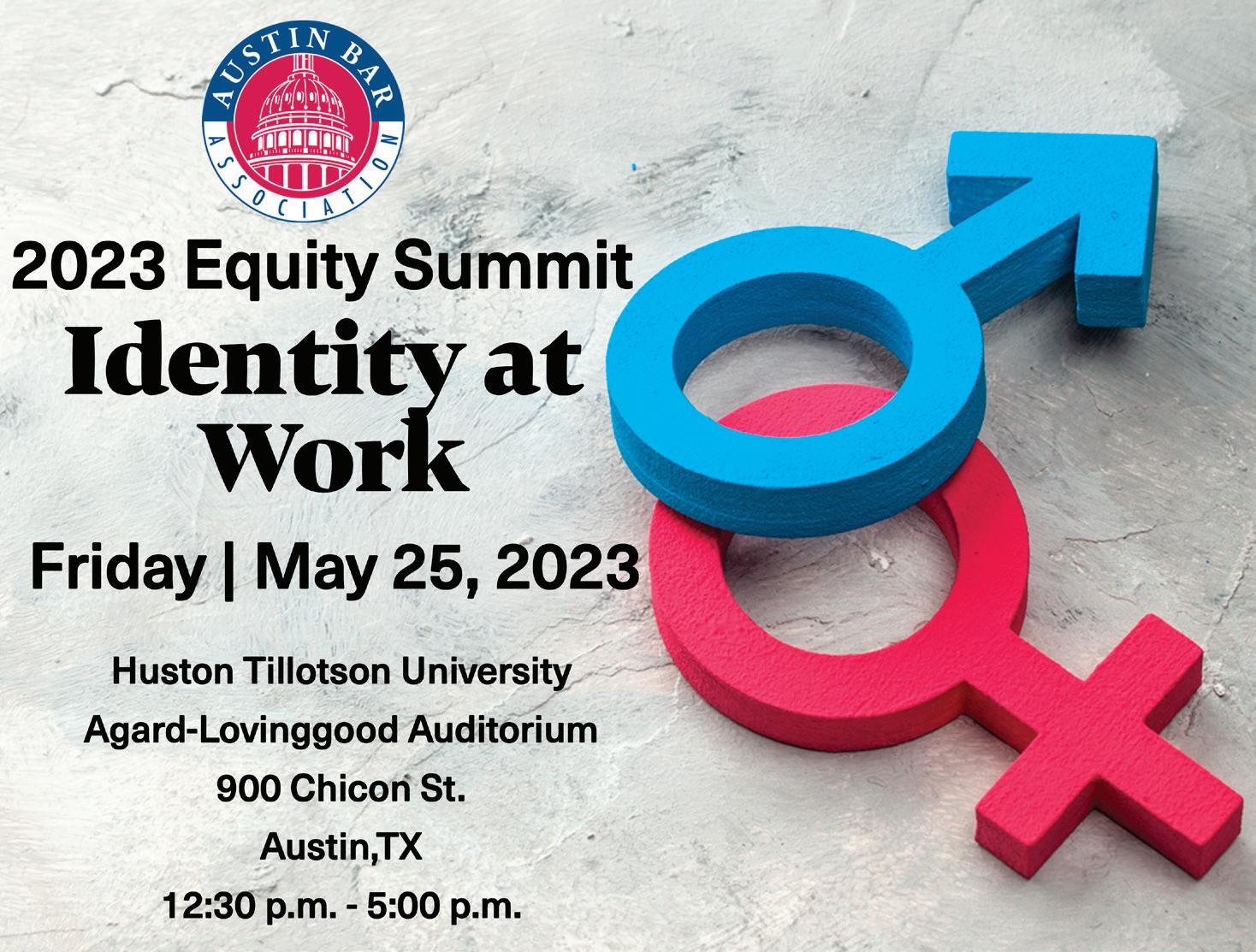

EXECUTIVE OFFICES
712 W. 16th Street
Austin, TX 78701
Email: austinbar@austinbar.org
Website: austinbar.org
Ph: 512.472.0279

DeLaine Ward Executive Director
Debbie Kelly Associate Executive Director
Rachael K. Jones Editor-In-Chief
Billy Huntsman Managing Editor
Austin Lawyer (ISSN #10710353) is published monthly, except for July/August and December/January, at the annual rate of $10 membership dues by the Austin Bar Association and the Austin Young Lawyers Association, 712 W. 16th Street, Austin, TX 78701. Periodicals Postage Paid at Austin, Texas. POSTMASTER: Send address changes to Austin Lawyer, 712 W. 16th Street, Austin, TX 78701.

Austin Lawyer is an award-winning newsletter published 10 times a year for members of the Austin Bar Association. Its focus is on Austin Bar activities, policies, and decisions of the Austin Bar board of directors; legislation affecting Austin attorneys; and other issues impacting lawyers and the legal professionals. It also includes information on decisions from the U.S. District Court for the Western District of Texas and the Texas Third Court of Appeals; CLE opportunities; members’ and committees’ accomplishments; and various community and association activities.
The views, opinions, and content expressed in this publication are those of the author(s) or advertiser(s) and do not necessarily reflect the views or opinions of the Austin Bar Association membership, Austin Bar Association board of directors, or Austin Bar Association staff. As a matter of policy, the Austin Bar Association does not endorse any products, services, or programs, and any advertisement in this publication should not be construed as such an endorsement.
Contributions to Austin Lawyer are welcome, but the right is reserved to select and edit materials to be published. Please send all correspondence to the address listed above. For editorial guidelines, visit austinbar.org in the “About Us” tab.
4 AUSTINLAWYER | MAY 2023
COFER & CONNELLY
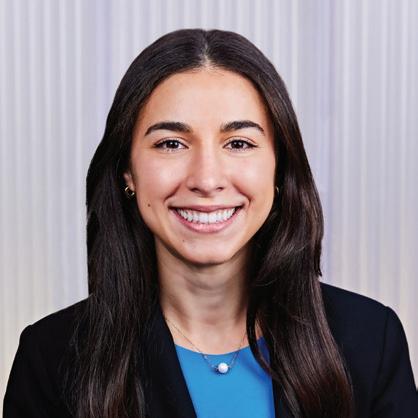

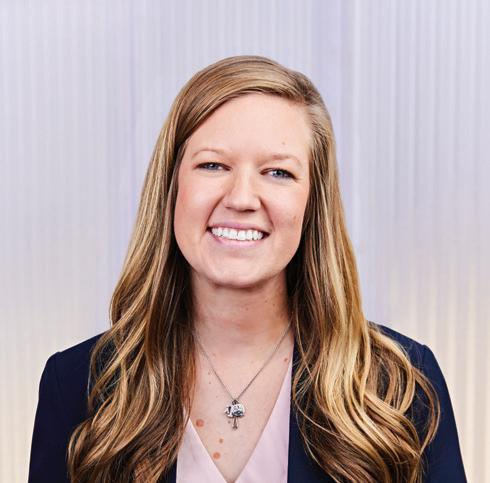
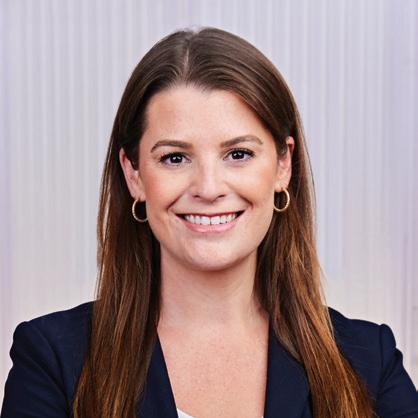
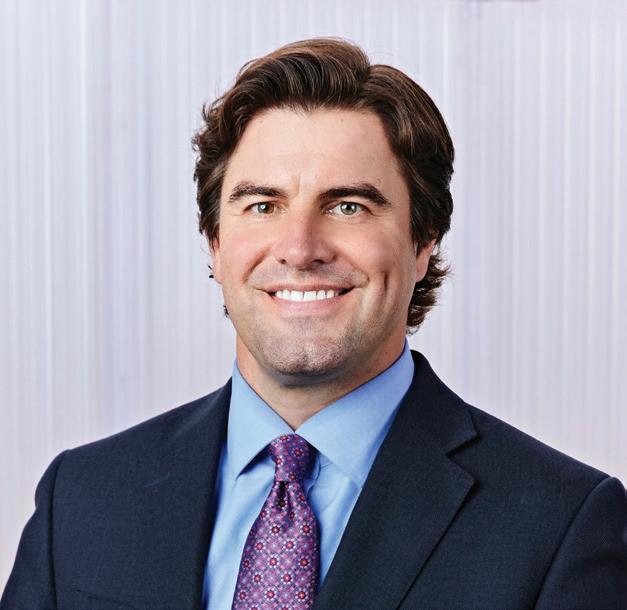



 Mark Pryor
Rick Cofer
Jaynie Badgett
Liz Duggan
Ramey Ko
Jeffrey Connelly
Mark Pryor
Rick Cofer
Jaynie Badgett
Liz Duggan
Ramey Ko
Jeffrey Connelly
AUSTIN H CENTRAL TEXAS H HILL COUNTRY PRINCIPAL OFFICE: 602 W. 11 TH ST., AUSTIN, TX 78701 • 512-200-3801 COFERCONNELLY.COM FAMILY LAW • CRIMINAL LAW • PERSONAL INJURY
Geoffrey Puryear
Natalia Tsokos
AMANDA ARRIAGA, TEXAS CASA
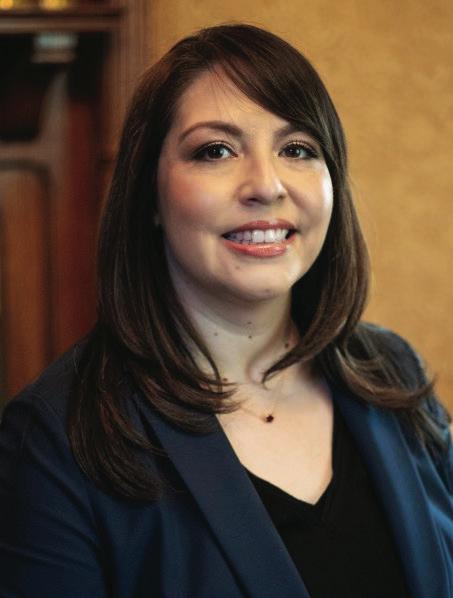
Take a Lesson from Beauty and the Beast: Don’t Be Afraid of Change


Throughout my career, I have usually been the person to lead the charge for a major change. I have been the change so often that I have written papers and given presentations about change management. When change happens to an organization, the pattern is always the same. Interestingly, it can mirror the five stages of grief.
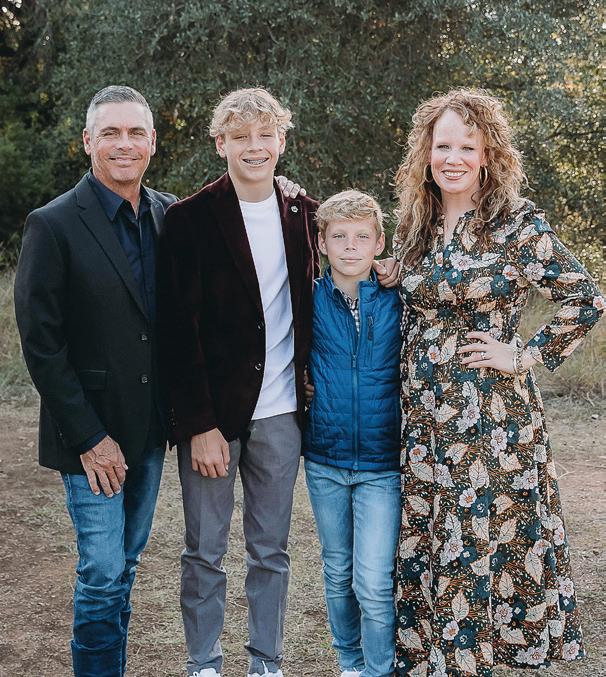
Major change can spark denial, anger, bargaining, depression, and acceptance. When change happens, how will you respond? For some people, change doesn’t seem to impact them; maybe because they are open-minded, or they don’t know how it was done before, so the change isn’t an issue; or because they were waiting for a change. Or maybe, years ago, they invented the thing that is going to be changed today.
Though those people might have already “graduated,” they may still hold firm to the idea that their way is the only way, and any change is a mistake.
I recently rewatched Disney’s Beauty and the Beast and realized that “Mob Song” gives examples of how some people deal with change at the beginning. If you don’t recall, “Mob Song” happens toward the end of the movie when Gaston
is angry that he was rejected by Belle in favor of the Beast. Gaston decides, rather than lose, he will lead a mob to the castle so that they can start a war with the Beast and his staff of enchanted objects.
In “Mob Song,” Gaston is the loud, scorned man, leading the opposition to change. His henchman, LeFou, leads the mob of followers for no other reason than he is trying to curry favor with Gaston. And while it’s not great to be a sycophant like LeFou, the people who make even less sense are the mob of Frenchmen. The two telling lines of the song that show the Frenchmen have no idea why they are following Gaston
are, “We don’t like what we don’t understand, in fact it scares us” and, “Here we come, we’re 50 strong and 50 Frenchmen can’t be wrong!”
When you hear about change and you see a mob forming, what do you do? Do you blindly follow and join the mob, or do you ask for more information?
I recommend that you do better than the 50 Frenchmen, a suck-up like LeFou, and a bully like Gaston. Be better. Be Belle. Ask questions and make your own choices. And when it’s your turn to be the changemaker, I hope you know that the five stages of grief will come, but change is good, and so are you. AL
PRESIDENT’S COLUMN
Andre New Vehicle Leasing / Pre-Owned Sales Domestics / Imports / Exotics Busy Schedule? Call me. Home or Office Viewing and Delivery Any Make. Any Model. Email | chris@appleleasing.com Phone | 512.653.3718 6 AUSTINLAWYER | MAY 2023
Chris
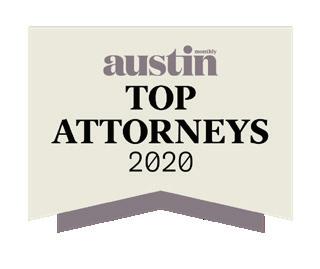



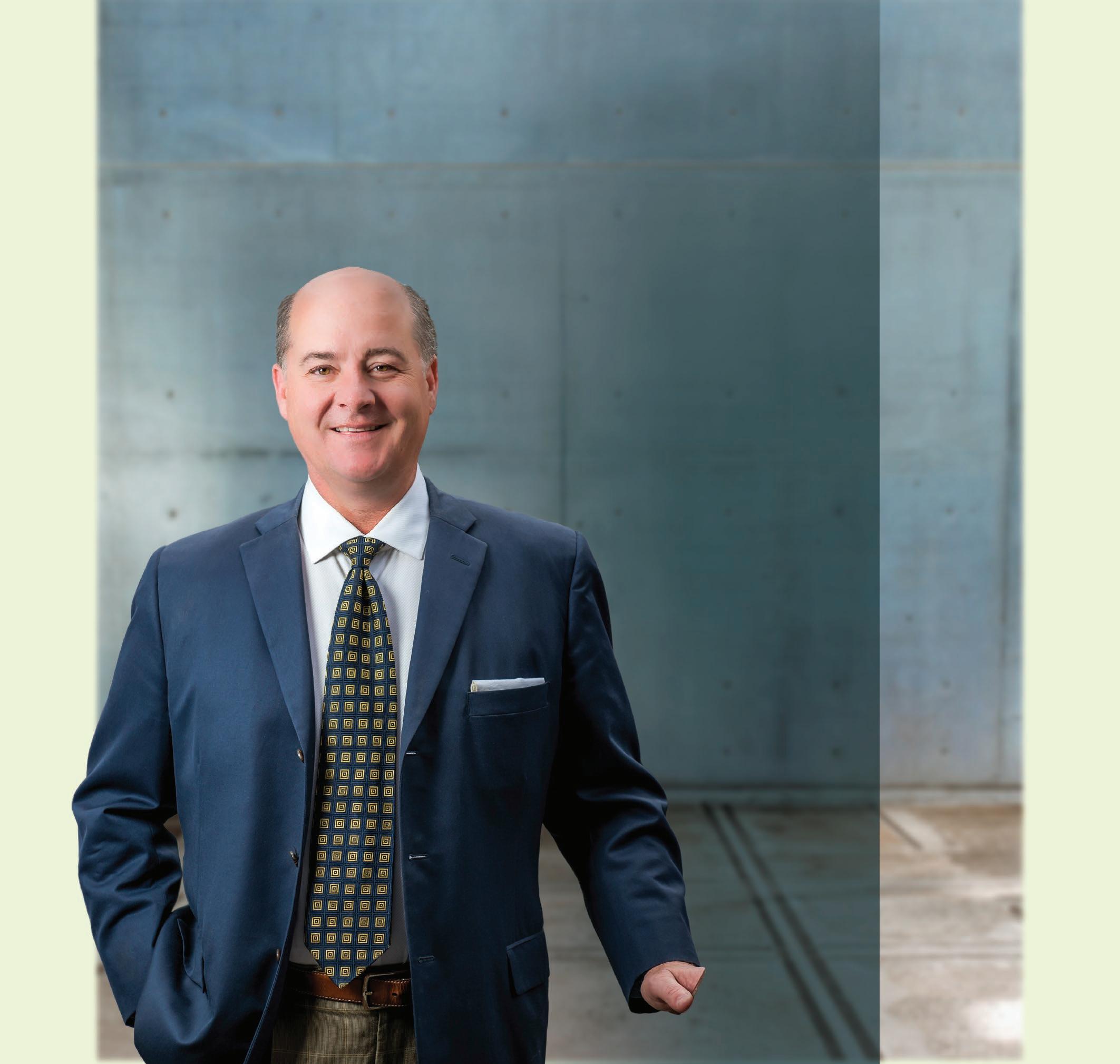


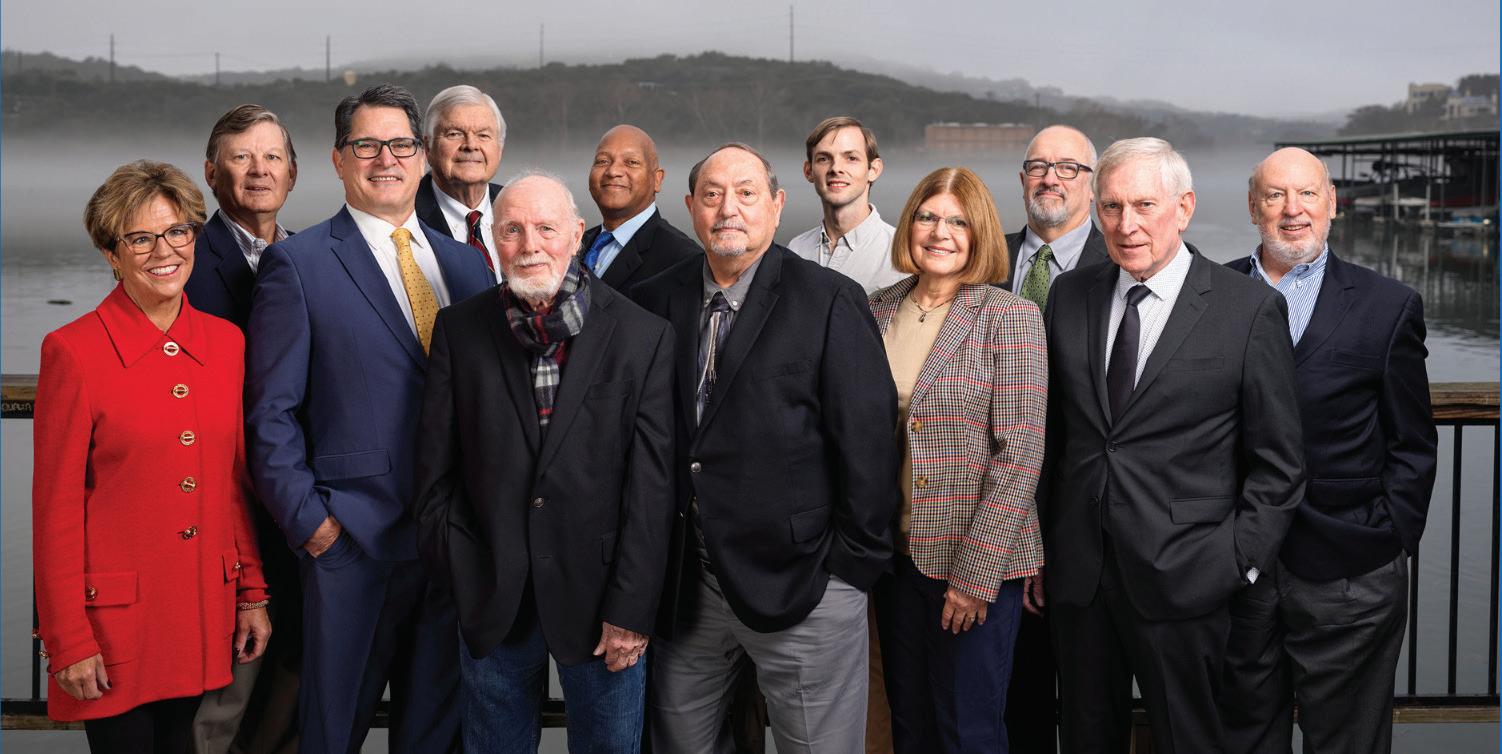
1101 S. Capital of Texas Hwy Building G, Suite 200 Austin, TX 78746 512.477 5796 | BCLAWTX COM Family Law | Real Estate | Construction Law | Commercial Litigation
The Bollier Ciccone team provides premium and personalized services to discerning clients seeking award-winning family and civil law a�orneys. T E XA S S UP E R LAWY E RS ® B U SI NESS L ITI G ATI O N 2 0 1 6–P R E S EN T THE BE S T LAWY ER S IN AMERI CA® C O MM E R CIA L L ITIG ATI O N 2 0 1 2 –P R E S EN T THE BE S T LAWY ER S I N AMERI CA® R E A L ES TATE LAW 2 0 1 2 –P R E S EN T AUSTIN MONTHLY TOP ATTORNEY 2 0 1 9 –P R E S EN T Armbrust & Brown, PLLC 100 CO N G R ESS AV E., SUI T E 1 3 0 0 • AU S T IN, T EX AS 78 70 1 5 12 -4 3 5-2 3 0 0 • FA X 512 -4 3 5-2 3 6 0 M H AWKI N S @A BAU S TI N CO M MARK L . H AW K I N S MEDIATION & ADR SERVICES LAKESIDE MEDIATION CENTER When experience matters. Celebrating its 23rd year, Lakeside is proud to welcome Jeff Jury and Tracy Allen, both past presidents of the International Academy of Mediators with decades of experience mediating and arbitrating cases. Collectively, Lakeside mediators have presided over 15,000 mediations and hundreds of arbitrations. Schedule a mediation online today! 3825 Lake Austin Blvd., Suite 403 Austin, TX 78703 | www.lakesidemediation.com adr@lakesidemediation.com | (512)477-9300 MAY 2023 | AUSTINLAWYER 7
Susannah A. Stinson | Leslie J. Bollier | Tony Ciccone
W.E.L.L. Summit – Women Empowering Leadership in the Law


Local Attorney Groups Join Forces to Present Women’s Leadership Conference
BY KRISTIANA BUTLER, GORANSON BAIN AUSLEY, PLLC
Thank you for meeting with me. I have a crazy idea.”
In the fall of 2022, Sherine Thomas started several Zoom meetings this way. She had the daunting task of convincing already-busy lawyers to dedicate time and resources to putting on a brand-new conference—within six months.
As an active member of the Austin legal community, Thomas saw a need for special programming tailored to local female lawyers. Thomas approached Caroline Hall, president of the Travis County Women Lawyers’ Association (TCWLA), and set up meetings with affinity groups to pitch the idea of hosting a conference for women attorneys in Austin. The response was a resounding “yes.”
“We thought maybe if we were really ambitious, we could pull off a conference, maybe just halfday,” Hall said. “National women lawyer conferences sound amaz -
ing, but I can’t get out of town and away from my family for three days. I was thrilled to think about us having something local to offer to the women in our community. We were blown away with how well-received the idea was and how committed and willing to help everyone was. A committee was formed and before we knew it, we had a full-day conference planned.”
Representatives from TCWLA, MAMAs (Mother Attorney Mentor Association), Cafecitos, The Sisters in Law, and League of Lady Lawyers formed the committee with the goal of building community among their groups and offering a full-day conference at no cost to attendees. The groups coalesced around the mission of Women Empowering Leadership in the Law, and the W.E.L.L. Summit was born.
“Each of the participating organizations brings unique perspectives, knowledge, and relationships from which the other organizations can benefit,” Thomas said. “At the same time, each organization recognizes the inherent value of knowledge, education, mentoring, and lifting each other up without regard to memberships or affiliations. The W.E.L.L. Summit provided a place for us to learn from each other, to hear about our journeys, and to build a community designed to support each other in the practice of law without taking away from each organization’s place in our community. The W.E.L.L. Summit highlighted each organization’s unique mission.”
CONFERENCE TOPICS
n Intention and Mindfulness: Strategies for Coping & Thriving in the Profession by Kiele Pace, founder of Austin Kiele and Pacefirm Consulting, LLC

n�Leveraging Social Media for a Successful Career by Laura Frederick, CEO of How to Contract and principal at Laura Frederick Law, PLLC; Joelle Schultz of Prospect Point Recruiting; and Sherine Thomas, Esq.
n�Easy Steps to Securing Your Personal Financial Future by Jennifer Failla, principal at Strada Wealth Management
n�Changing the Rules of the Game: A Legislative Update and Insider’s View of Women’s Role in Making the Law by Senator Sarah Eckhardt, Representative Lulu Flores, and Representative Vikki Goodwin
n�Dealing with Burn Out: Unique Issues Facing Women Lawyers by Michelle Fontenot, J.D., M.Ed., Austin Texas Lawyers’ Assistance Program; and Kathy Richardson, J.D., Austin HR Legal Search
n�Owning the Room: Holding Your Own in Meetings, Depositions, & Court by Carroll Martin, Scott Douglass & McConnico, LLP; Katherine Chiarello, Wittliff Cutter, PLLC; and Karen Burgess, Burgess Law PC
BE WELL
Kristiana Butler is a family law attorney in the Austin office of Goranson Bain Ausley, PLLC, and the co-president of MAMAs (Mother Attorney Mentor Association).
W.E.L.L. Summit committee members. BACK ROW (L-R): Ashley Nwonuma, Christie Mason Hebert, Liz Overton Nielsen, Caroline Hall Nelson, Kristiana Butler, Jane Atwood. MIDDLE ROW (L-R): Rachel Luna, Danielle Gilbert, Leslie Wood Dippel. FRONT ROW (L-R): Nicole LeFave, Sherine Thomas
“ 8 AUSTINLAWYER | MAY 2023
Programming focused on business development, personal finance, battling burnout, negotiating salaries, and owning the room, in addition to providing time for networking.
Senator Sarah Eckhardt, a keynote speaker on a lunchtime panel with Representative Lulu Flores and Representative Vikki Goodwin, encouraged attendees to step up and stand out.
“It is past time for us to lead,” Sen. Eckhardt said.
Thomas echoed Sen. Eckhardt’s sentiment about women in leadership.

“At the end of the day, it helps our entire community when women are empowered and prepared for leadership roles in the legal profession,” Thomas said. “The W.E.L.L. Summit provided a place for us to get ready together.” AL

TCWLA
PARTICIPATING ORGANIZATIONS
Travis County Women Lawyers’ Association (TCWLA) was founded in 1977 with 33 members and has now grown to over 300 active members. TCWLA’s mission is to:
• Foster communication among women lawyers.
• Strengthen the image and position of women lawyers in the community.
• Work toward the elimination of gender bias.
• Inform the public about legal issues affecting women.
• Work toward the enhancement of the public perception of the legal profession.
TCWLA is committed to supporting issues affecting women both as lawyers and as members of society. Learn more at tcwla.org.
MAMAs
The Mother Attorney Mentor Association (MAMAs) is over 1,500 members strong and aims to provide educational opportunities for its members (mothers, stepmothers, and mothers-to-be who are lawyers, JDs, or law students) on topics pertaining to career advancement, networking, parenting issues, identifying and solving problems unique to working mothers, and other professional guidance and social events designed to permit women to connect and mentor one another about navigating a legal career while raising children. Learn more at mamasaustin.org.
Cafecitos
Cafecitos is an intimate, intergenerational network of Latina lawyers in Austin. Founded in January 2022, the group seeks to connect and support Latina lawyers practicing in Austin through informal gatherings.
Cafecito meetings are free of charge and are open to all Latina or Hispanic women attorneys. If you are interested in learning more, visit Cafecitos on Facebook or email mac@wittliffcutter.com.
The Sisters in Law, LLC
The Sisters in Law, LLC is an online platform for minority women in the legal profession to share experiences, open reflections, and lessons learned. We strive to bring together women of color and their allies to foster a community of encouragement and inspiration for the next generation of young lawyers. The Sisters in Law, LLC accomplishes this by creating space—both virtual and in person—for connection and professional development.
Additionally, The Sisters in Law, LLC is a collective voice in the conversation on diversity, equity, and retention within the legal field. Learn more at thesistersinlaw.com.
League of Lady Lawyers
The League of Lady Lawyers (LLL)’s goal is to create a support network and peer-to-peer mentoring group for young or young-in-their-career female lawyers in Austin. Being a young lawyer can be intimidating—you have so many questions and there are so many things you don’t know. But you’re not alone. There are other young female lawyers experiencing the same things that you are.
We created LLL to help connect those women. We hope our members form a network that supports and uplifts them throughout their careers. Learn more about the League of Lady Lawyers on Facebook.
Patrick Keel Former District Judge Mediator Arbitrator patrickkeel.com Available by video and in person.
A panel discussion focusing on business development, personal finance, battling burnout, negotiating salaries, and owning the room. Pictured (L-R): Karen Burgess, Carroll Martin, Katherine Chiarello, and Ashley Nwonuma.
MAY 2023 | AUSTINLAWYER 9
NEW MEMBERS
The Austin Bar welcomes the following new members:
Neema Amini
Mario Boisselier
Marion Brooks
Krystina Denos
Catherine Elmore
Jordan Garsson
Barbra Gazo
Nelly Herrera
Harsharan Kaur
John Moore
Shannon Noble
Sophia Palat
Nilesh Patel
MOVING ON UP
Srinivas
Giri Pathmanaban
Peter Radakovich
Toni Reeves
Erin Screenivasan
Allison Steele
Alex Tarnow
Cole Wilson
Meredith N. McIver has been promoted to partner at Osborne, Helman, Scott, Knisley & Stanton. McIver focuses on estate planning and the administration of highnet-worth estates and trusts. McIver received her J.D. from Samford University’s Cumberland School of Law and her L.L.M. in tax law from the University of Houston Law Center.
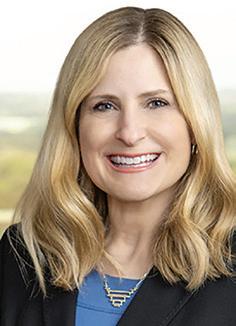
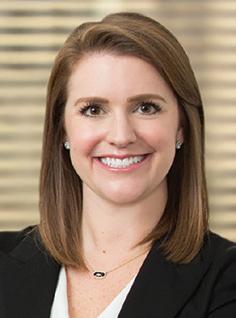
Amanda Neinast has been promoted to partner at the Austin office of Jackson Walker LLP. Neinast’s practice focuses on advising mineral rights owners on transfer techniques. Prior to coming to Jackson Walker, Neinast served as in-house counsel for a land brokerage firm in Midland, Texas.
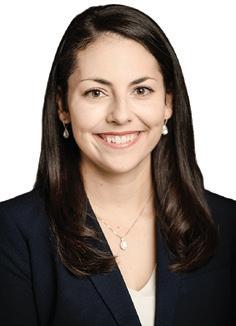
Neinast was named a fellow of the Texas Bar Foundation in 2020.

Jackson Walker LLP has hired Tara Potts as a Trusts & Estates partner. Potts will advise organizations on a variety of nonprofit corporate and tax-related issues under Internal Revenue Code Section 501(c). She also advises private foundations and higher-education institutions, social welfare organizations, trade associations, business leagues, title-holding companies, and social clubs. She is a licensed attorney as well as a certified public accountant.
Cade Satterfield has been promoted to partner at the Austin office of Jackson Walker LLP. Satterfield is a corporate attorney focusing on private equity, which includes the creation of platforms for investment opportunities and portfolio dealing. In 2022, Sat-
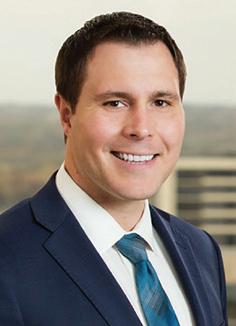
terfield was recognized as a Texas Rising Star by Thomson Reuters’s Super Lawyers.
Megan N. Watkins has been promoted to partner at Osborne, Helman, Scott, Knisley & Stanton. Watkins focuses on fiduciary litigation, primarily involving trust and estate disputes. Watkins also represents fiduciaries and beneficiaries in connection with contentious trust and estate administrations, including appeals of all civil matters. Watkins received her J.D. from The University of Texas School of Law.

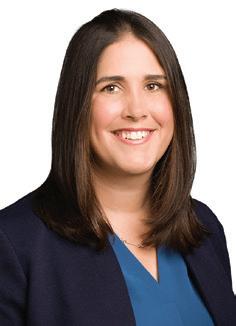
SUBMIT A BRIEF
If you are an Austin Bar member and you’ve moved, been promoted, hired an associate, taken on a partner, or received a promotion or award, we’d like to hear from you. Notices are printed at no cost, must be submitted in writing, and are subject to editing.
Announcements should include all pertinent information, including firm name, address, and contact numbers. Send submissions along with a high-resolution head shot to Austin Lawyer managing editor Billy Huntsman at billy@austinbar.org. AL

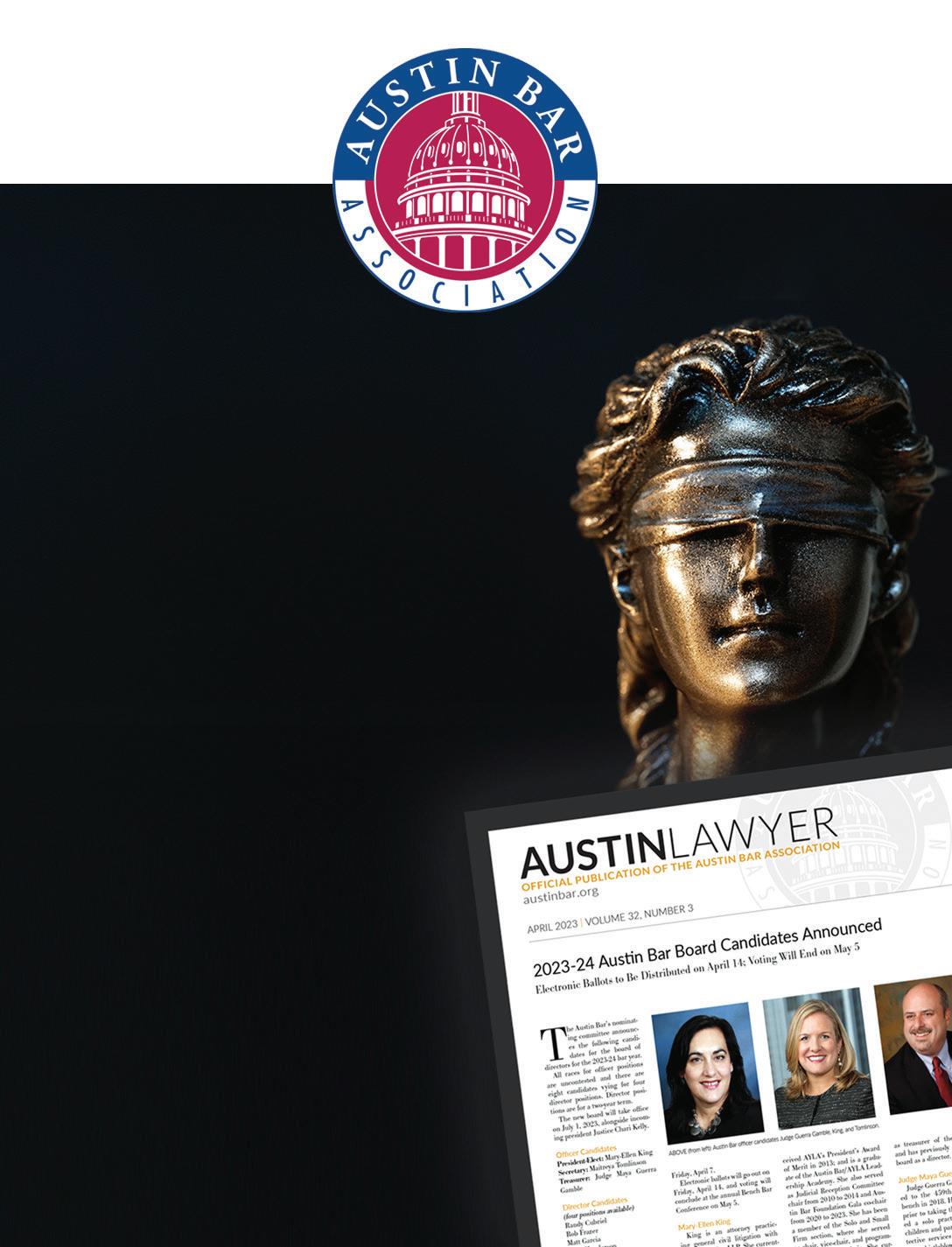
Austin Bar Launches App
Austin Bar Association Launches New App for Our Members
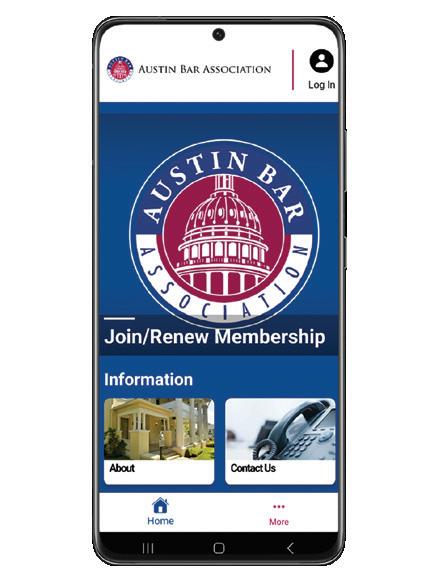
The app is available on both Android and Apple phones.
One of the features of the app is push notifications, which alert you when important updates happen in the app, such as new CLE on demand, new scheduled events, and membership renewals. It also allows you to access digital materials at in-person CLEs, such as PowerPoints and papers.
The app was designed in-house by CLE, Sections, and Events Manager Caleb Armstrong.
“We designed the app in order to make CLE and events more convenient and accessible to our
members,” he said.
The app is new and more features will be added in the coming months.
The app uses the same login credentials as your austinbar. org account, and you can manage your member ship right in the app.
The app is available for free in both the Google Play Store and the Apple App Store, by searching “Austin Bar Association.”
BRIEFS
Want to congratulate someone on a hard-won case? Send kudos to Billy@AustinBar.org to be featured in Austin Lawyer » AustinBar.org austinbar.org APRIL 2023 VOLUME 32, NUMBER 3 The Austin Bar’s nominating committee announces the following candidates for the board of directors for the 2023-24 bar year. All races for officer positions are uncontested and there are eight candidates vying for four director positions. Director positions are for a two-year term. The new board will take office on July 1, 2023, alongside incoming president Justice Chari Kelly. Officer Candidates President-Elect: Mary-Ellen King Secretary: Maitreya Tomlinson Treasurer: Judge Maya Guerra Gamble Director Candidates (four positions available) Randy Cubriel Rob Frazer Matt Garcia Mary Henderson Rachael Jones Cheryn Netz Shelby O’Brien Ciara Parks qualified member not reFriday, April 7. Electronic ballots will go out on Friday, April 14, and voting will conclude at the annual Bench Bar Conference on May 5. Mary-Ellen King King is an attorney practicing general civil litigation with Thompson Coe LLP. She currently serves as secretary of the Austin Bar board. She has served as treasurer and as a director of the Austin Bar, as well as the AYLA board of directors. King was named the Bar Outstand2023-24 Austin Bar Board Candidates Announced Electronic Ballots to Be Distributed on April 14; Voting Will End on May 5 ceived AYLA’s President’s Award of Merit in 2013; and is a graduate of the Austin Bar/AYLA Leadership Academy. She also served as Judicial Reception Committee chair from 2010 to 2014 and Austin Bar Foundation Gala co-chair from 2020 to 2023. She has been a member of the Solo and Small Firm section, where she served as chair, vice-chair, and programming committee chair. She currently serves as president of the Austin Chapter of CLM, on the Women Symphony League board of directors, as Outreach on AusPilgrimage Council, on the the as treasurer of the Austin Bar and has previously served on the board as a director. Judge Maya Guerra Gamble Judge Guerra Gamble was elected to the 459th District Court bench in 2018. Her varied career prior to taking the bench included a solo practice representing children and parents in child protective services cases; representing whistleblowers at O’Connell & Soifer; prosecuting child pornography and child exploitation cases for the Texas Attorney General; suing companies committing fraud against the United States for Department of Justice; and ABOVE (from left):Austin BarofficercandidatesJudge Guerra Gamble, King, andTomlinson.
10 AUSTINLAWYER | MAY 2023
ABOVE (from left): McIver, Neinast, Potts, Satterfield, Watkins
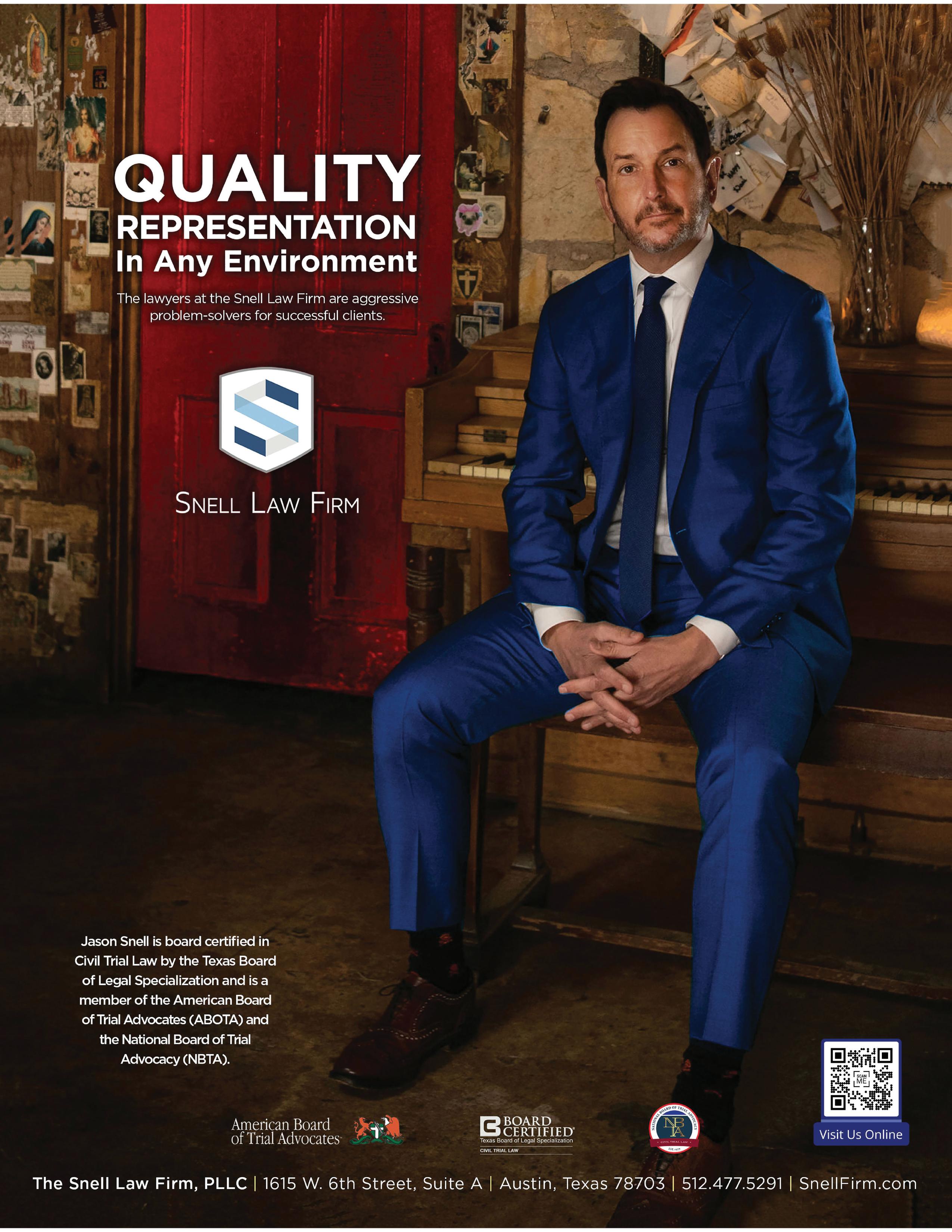
How Do Legal Writers Use Cases?
Empirical
Research on Use of Case Law
 BY WAYNE SCHIESS, TEXAS LAW, LEGALWRITING.NET
BY WAYNE SCHIESS, TEXAS LAW, LEGALWRITING.NET
For a recent law-review article, a professor at Texas A&M University School of Law undertook a labor-intensive and thoughtful empirical study of the ways advocates and decision-makers use case law. The results are informative and offer insight into how to use case-law authority to improve your chances of winning.
The article, by Professor Brian N. Larson, is called “Precedent as Rational Persuasion.”1 Professor Larson assembled a corpus of 199 documents: advocates’ trial briefs and the court opinions responding to those briefs. He and his assistants then categorized “all citations to and discussion of a court opinion in a section of a legal argument to support the assertion of the author’s claim in that section of argument.”2
In other words, for each citation to a case, he assessed how that case was used. (Some uses overlapped.)
Larson identified five recurring ways that advocates and judges use cases:
1. Rule: as support for a legal standard that can be applied to facts to reach an outcome.
2. Quotation: as the source of a quotation.
3. Example: a description of a prior court’s decision under the relevant law; this use often included the prior case’s facts and outcome and could be used for analogy or distinction.
4. Why: as a source for a policy underlying or supporting the law in the area under consideration— the why of a legal rule or standard.
5. How: to support a generalization about what courts often or usually do in cases like the one under consideration—how courts generally resolve disputes of this type.3
These case-law uses aren’t surprising given the way legal analysis usually works. We might imagine a judge asking these kinds of questions:
• “What’s the governing stan-
dard?” (rule)
• “Who says so and what do they say?” (quotation)
• “Tell me about a previous case that, under our precedential system, supports your outcome.” (example)
• “What policy supports this legal rule?” Or, “Why does our system sustain such a rule?” (why)
• “How have other courts faced with this question resolved it?” (how)4
The first interesting result Larson found was the ranking of most-frequent to least-frequent uses of case law. The order presented above is also the order of most frequent to least-frequent use of cases in both the trial briefs and the judicial opinions he assessed. In other words, trial-level legal writers, both advocates and judges, used case law in this order from most- to least-frequent:
1. Rule
2. Quotation
3. Example
4. Why (policy)
5. How (generalization)
Given the way our common-law system of precedent works—or is supposed to work—these results are sensible and reassuring. Legal writers and decision-makers rely on established legal rules and concepts; they quote those legal concepts—suggesting precedential validity; and they use prior examples as guides for resolving disputes.
But what’s interesting emerged when Larson correlated the use of case law with outcome. Although he alleges no causal relationship, his article supports the following correlations:
• Winning briefs tended to contain more why (policy) than losing briefs.
• Winning briefs tended to contain more how (generalization) than losing briefs.
The takeaways from Larson’s study are subtle and far from openand-shut, which he acknowledges.5 But I’ll offer my own advice here:
First, if you want your trial brief to look and sound like a normal trial brief (and who wants their
brief to strike the court as odd or unconventional?), you’ll continue to make thorough and careful use of cases to do three customary things: support legal rules; serve as the source for quotations of legal rules and concepts; and present case examples that have applied those legal rules.
Second, you’ll find a way to include in your brief some “how” and “why”: why our legal system supports the legal rule you want applied and how previous courts have decided cases like yours. Those uses correlate with winning. AL
FOOTNOTES
1 Brian N. Larson, Precedent as Rational Persuasion, 25 Legal Writing: Journal of the Legal Writing Institute 135 (2021) (Larson’s article is long, complex, and statistically intense; the content in this column is simplified and generalized).
2 Id. at 140.
3 Id. at 169-70 (describing the five types).
4 Id. at 173.
5 Id. at 199.
OPENING STATEMENT
12 AUSTINLAWYER | MAY 2023
partners:

Online Paralegal Certificate Programs

Keep your best employees learning with online training from UT Austin.
Next instructor-led course starts June 6, or start the self-paced option today.
Attend a free information session or visit professionaled.utexas.edu/paralegal
associate attorneys:
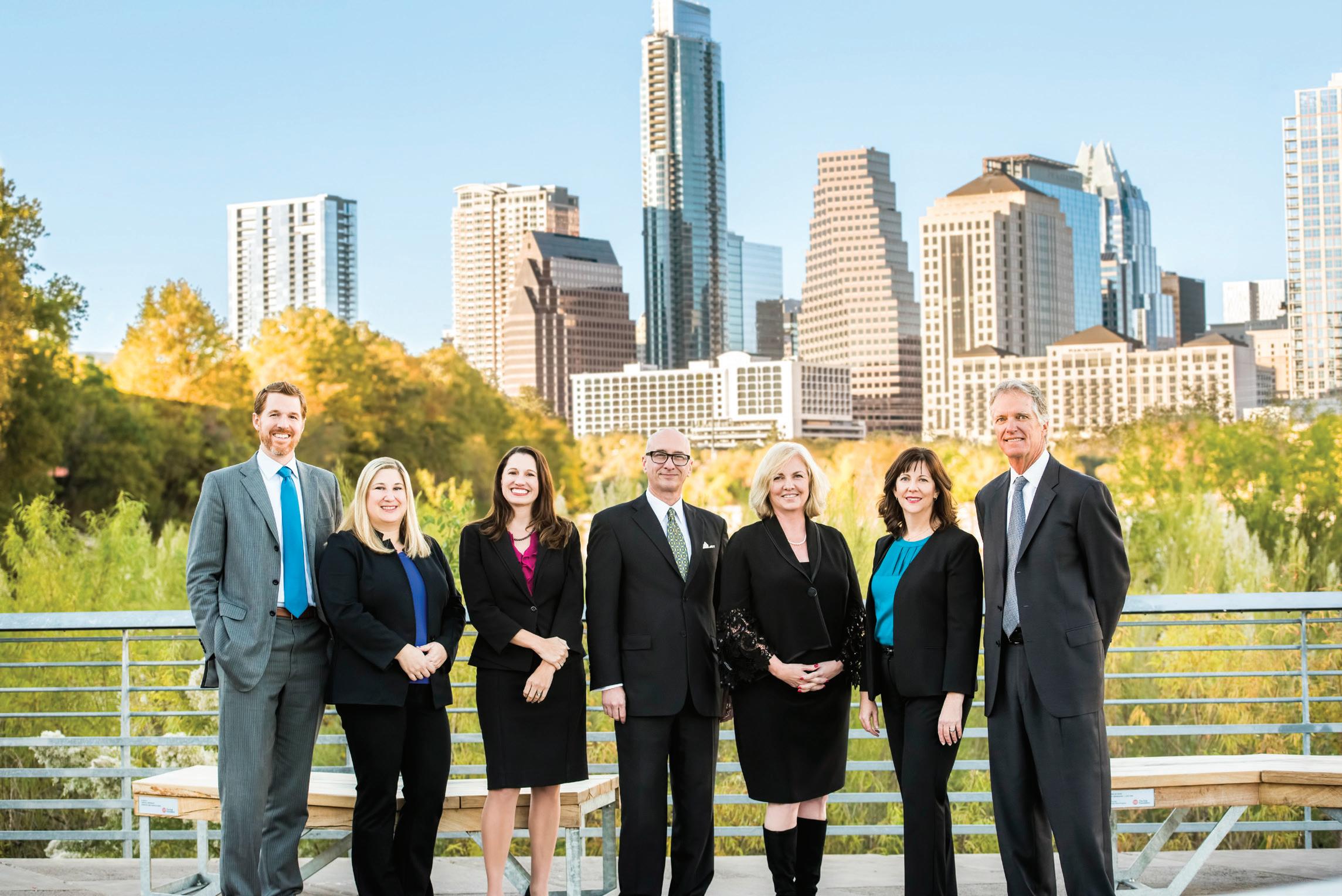 Arielle Rosvall, Coleen Kinsler
Arielle Rosvall, Coleen Kinsler
MAY 2023 | AUSTINLAWYER 13
AYLA PRESIDENT’S COLUMN
BLAIR LEAKE , WRIGHT & GREENHILL, P.C.
Gamble on Our Profession’s Future at the 2023 Casino Night Fundraiser
According to a recent Mitchell Hamline Law Review study,1 the legal profession is the least diverse profession in the nation. Let that superlative sink in. The 2023 Leadership Academy Casino Night event on June 24, 2023 takes aim at that issue by raising funds to support the Youth Justice Alliance (YJA), a local nonprofit dedicated to investing in aspiring first-generation lawyers.
The same study found that 88 percent of U.S. attorneys are White. Less than five percent of associates are Black, which is less than the percentages of the same in 2009. According to the Youth Justice Alliance, roughly 19 percent of the U.S. population is Hispanic and roughly 13 percent is Black, whereas each group makes up only roughly five percent of the U.S. attorney population, respectively.
The same study notes that, by 2014, law school student bodies were made up of roughly onethird racial or ethnic minorities, but such groups only constituted 6.6 percent of equity partners at law firms as of 2019—a stark difference, in light of the fact that the Non-Hispanic White demographic made up only 61.6 percent of the U.S. population, per the 2020 census. Sweatt v. Painter has been the law of the land since 1950, and thus 70 years of “access” to legal education has not been enough on its own to heal the demographic disparities
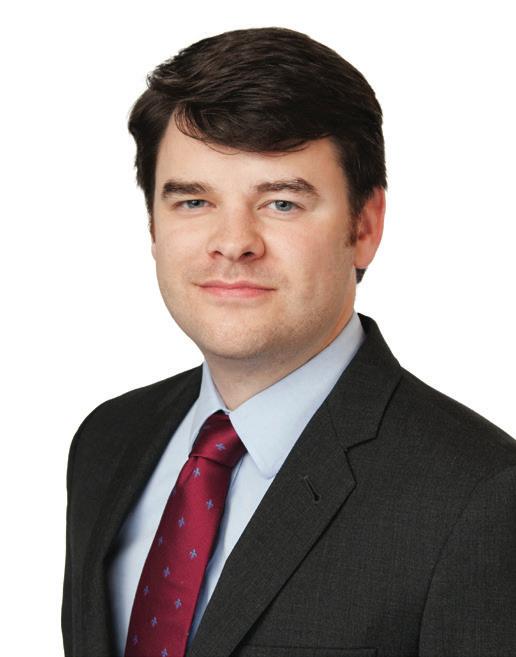
in our profession. With rumblings of an impending Supreme Court decision striking down Regents of the University of California v. Bakke, the task of systemically facilitating diversity within the legal profession will fall largely to nonprofits.
Enter YJA. Austin’s own Armin Salek founded the group after his AISD high school legal course won the 2020 Dan Rather Prize for the Best Idea to Innovate Texas Education. He subsequently received a Zuckerman Fellowship to the Harvard Graduate School of Education to scale the Akins High School model to other campuses. YJA offers benefits that include, but are not limited to, paid training, paid internships, LSAT funding, classroom education, and mentorship to aspiring first-generation attorneys. One of the group’s main strategies is to address disparity early—far earlier than Big Law minority quotas or the law school admissions process. YJA provides high school students access to resources and institutional knowledge about opportunities in the legal profession to promote a “proactive model” of diversity. The end goal is to democratize access to legal knowledge and legal careers, organically reduce population-attorney demographic disparities long-term, and help facilitate a profession better suited to providing legal services to under-supported communities.
Every year since 2012, AYLA and the Austin Bar Association have jointly run a program known as Leadership Academy. Roughly 30 local attorneys are chosen yearly from a pool of applicants. Each year’s class goes through a regimen of lectures and inter-
active events all geared toward developing leadership skills. Perhaps more importantly, each class is tasked with working together to plan and execute one large class project. The class must design the project, determine the leadership structure for the planning and execution of it, and then get to work making it happen—all on their own.
The 2023 Leadership Academy class is hosting the Casino Night event to raise money to help YJA further its goals. The June 24 event at Chateau Bellevue will feature blackjack, craps, and other

games, and include an open bar, live music, and a silent auction. Four different levels of sponsorships are available, and all contributions are tax-deductible.
Donate, attend, place your bets, bid, and enjoy a night of music and libations. By the time the night is over, gambling on our profession’s future will have never felt so good.
FOOTNOTES
1 Sybil Dunlop and Jenny GassmanPines, Why the Legal Profession Is the Nation’s Least Diverse (And How to Fix It), 47(1) Mitchell Hamline L.Rev. 129 (2021).
5:30 – 7:00 p.m.
Industry East 1211 E. 5th St. Ste. 150
Sponsored by Exponent
AUSTIN YOUNG LAWYERS
14 AUSTINLAWYER | MAY 2023
ASSOCIATION
UPCOMING
EVENTS
AL
THURSDAY, MAY 18 AYLA Docket Call 5:30 – 7:00 p.m. Industry East 1211 E. 5th St. Ste. 150 Sponsored by Exponent THURSDAY, MAY 18
AYLA Docket Call
AYLA Honors Award Winners
Kelly, McLeggan-Brown, Naranjo Earn Honors for Their Work, Contributions
The AYLA board of directors has recognized members of our community for three prestigious awards. These local winners will be submitted to Texas Young Lawyers Association as nominees for the corresponding statewide awards.
The Mentor Award recognizes an attorney who has consistently demonstrated a commitment to mentoring young lawyers in the legal community. This year’s winner is Justice Chari Kelly.

The Liberty Bell Award recognizes one outstanding non-lawyer in Texas who has made the most selfless contribution to his or her community to strengthen the effectiveness of the American system of justice by instilling better understanding and appreciation of the law. This year’s winner is Katie Naranjo.


The Outstanding Young Lawyer Award recognizes a young lawyer who has demonstrated professional proficiency, service to the profession, and service to the community. This year’s winner is Dominique McLeggan-Brown.
Thank you to everyone who submitted a nomination and for everyone who serves our community.
Second Annual AYLA Crawfish Boil Fundraiser a Success
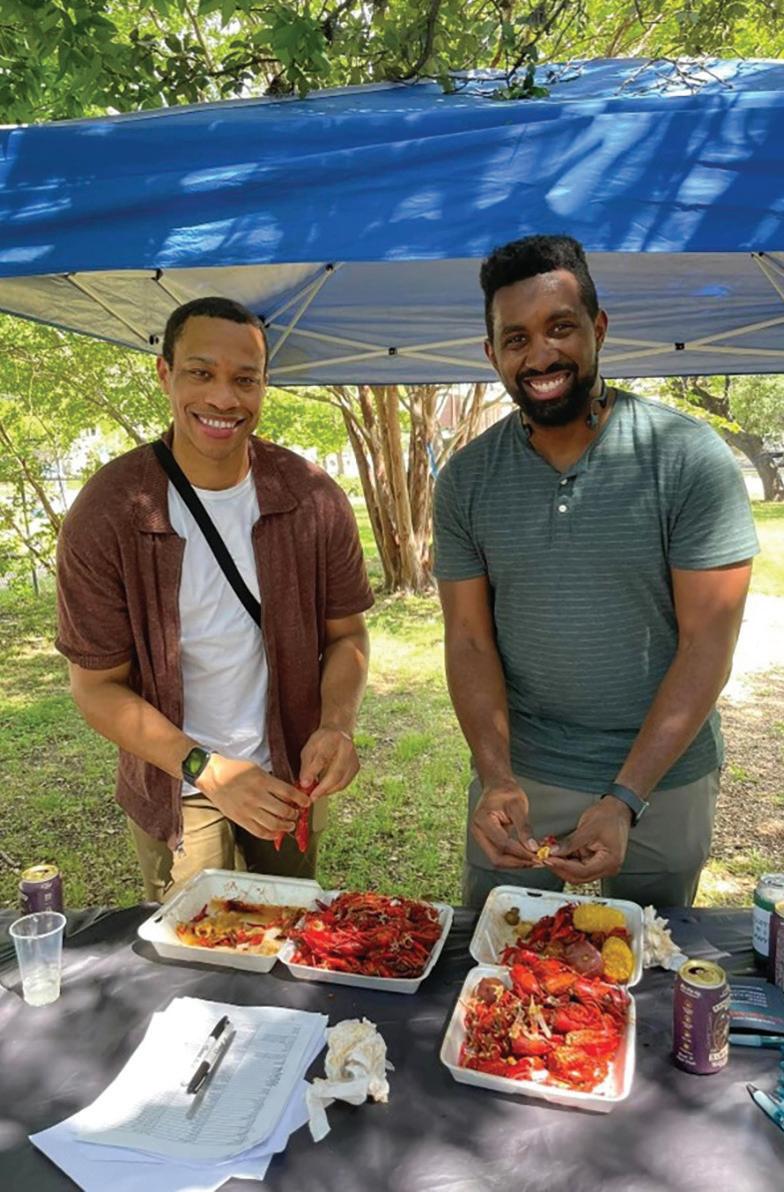
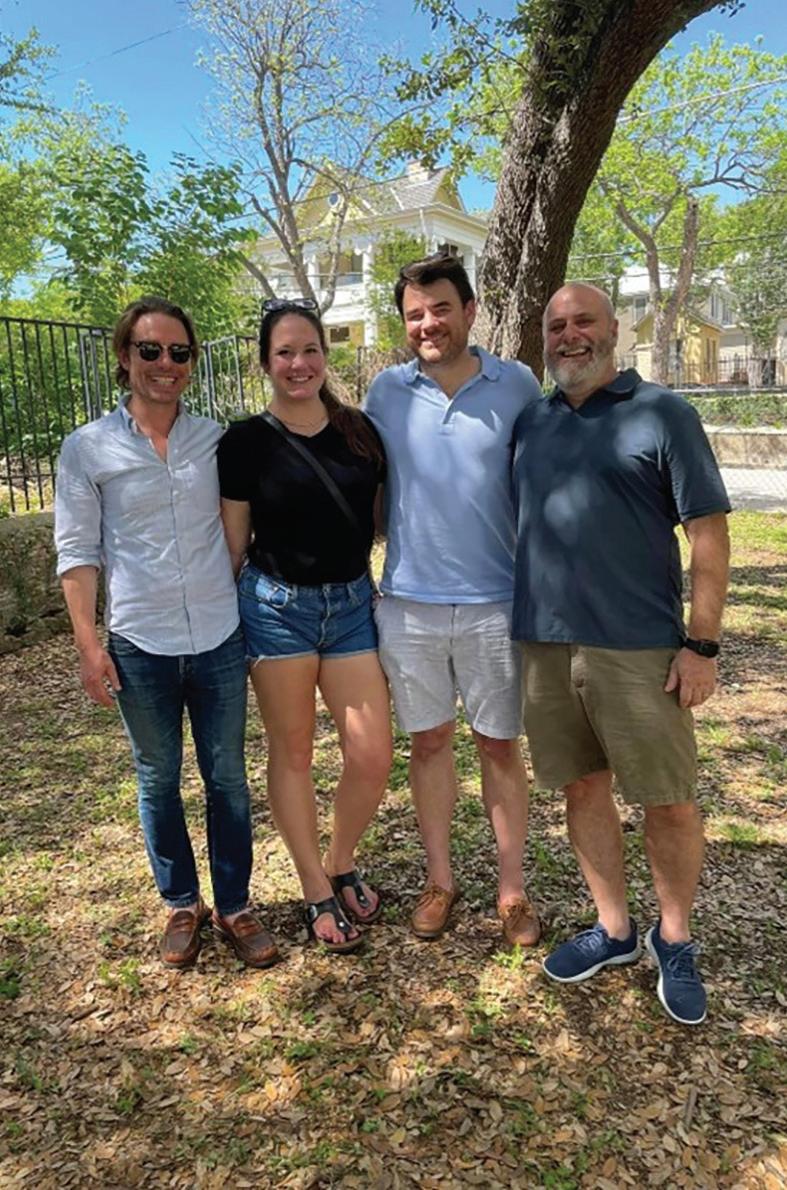
The Austin Young Lawyers Association held its second annual Crawfish Boil on Saturday, April 15 in the oak-covered park across the street from Hilgers House. People of all ages satisfied their envie for crawfish, shrimp, sausage, and more courtesy of Louisiana Wild, and also enjoyed sunshine, libations, corn hole, and live music from attorney-musicians the Bad Precedents. The event raised over $15,500 after expenses on behalf of the AYLA Foundation, and over 150 people attended. Alex Conant of Amini & Conant LLP was crowned “Rex” for the day to reward his firm for being the top sponsor of the event. AYLA appreciates everyone who sponsored and came out, and we hope to see you there again next year. Until then, laissez les bon temps rouler.
Austin Bar & AYLA Members
Participate in Cap10K
Twenty-eight members of the Austin Bar Association and Austin Young Lawyers Association woke up early Sunday, April 16, to participate in the 46th annual Statesman Capitol 10K.
Thank you to everyone who ran or came out and cheered! We hope to see you again next year.
Rex Carnival King
Amini & Conant
King Crawfish
Bollier Ciccone
Bruce & Deborah Clark –
Clark ADR
Howry, Breen & Herman
Lakeside Mediation
Longhorn Imaging
Pluymen Law
Richards Rodriguez & Skeith
Walters Gilbreath
Wright & Greenhill
Crawfish Gumbo
Expert Witness Doctors (Austin, Texas)
Crawfish Etouffe
Cool Kids AC & Heat
Greenberg Traurig
Jackson & Aguirre
Law Firm
Kaplan Law Firm
Rocket ADR
Rose Resolution Group
Sandoval & James
Superior Mediation
The Tomlinson Firm
Thompson Law
Trustpoint.One
Vaught Law Firm
Woolbert Law Firm
Crawfish PoBoy
ATX Bilingual Mediation
Graves Dougherty
Hearon & Moody
Hanna & Plaut
Hargett Mediation
IST Management Services
Lloyd Gosselink
Phelps Law Firm
Redbud Mediation
Veritext Legal Solutions
Walsh Gallegos Treviño
Kyle & Robinson
Winckler & Harvey
AUSTIN YOUNG LAWYERS ASSOCIATION
TOP: The second annual AYLA Crawfish Boil Fundraiser mixed philanthropy with spice. BOTTOM: Thank you to the AYLA Crawfish Boil Fundraiser sponsors for the delicious food and drink.
MAY 2023 | AUSTINLAWYER 15
ABOVE (from left): Justice Kelly, McLeggan-Brown, Naranjo.
you, Sponsors!
AYLA Foundation Crawfish Boil Fundraiser
Thank
Special
to: Ben E. Keith | Kuleana Rum Works | Ranch Rider Spirits Co. | Richard’s Rainwater
Thanks
The following are summaries of opinions issued by the Fifth Circuit in March 2023. The summaries are overviews of particular aspects of the opinions; please review the entire opinions.
AMERICANS WITH DISABILITIES ACT: Reassignment in violation of a hospital’s most-qualified-candidate policy is not a reasonable accommodation in most cases.
EEOC v. Methodist Hosps. of Dallas, No. 17-10539, 2023 WL 2553910 (5th Cir. Mar. 17, 2023).
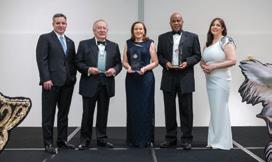
In 2008, Methodist hired Cook as a patient care technician. Four years later, Cook injured her back on the job. No longer able to perform her job duties, Cook requested reassignment to a vacant scheduling coordinator position in the hospital’s surgery department. Pursuant to its established policy of hiring only the most qualified candidate, Methodist instead hired an applicant more qualified than Cook.
The EEOC sued on Cook’s behalf under the ADA. The EEOC argued that making an exception to Methodist’s most-qualified-candidate policy is a reasonable accommodation and thus required by the ADA.
The district court disagreed and granted summary judgment
for Methodist. On appeal, the Fifth Circuit agreed with the district court only in part and remanded for further proceedings.
The Fifth Circuit examined US Airways, Inc. v. Barnett, 535 U.S. 391 (2002), which held that reassignment is not necessarily a reasonable accommodation when reassignment would run afoul of the employer’s established seniority system. The Supreme Court explained that while reassignment is usually reasonable, the importance of a seniority system to employee-management relations dispositively changed the calculus.
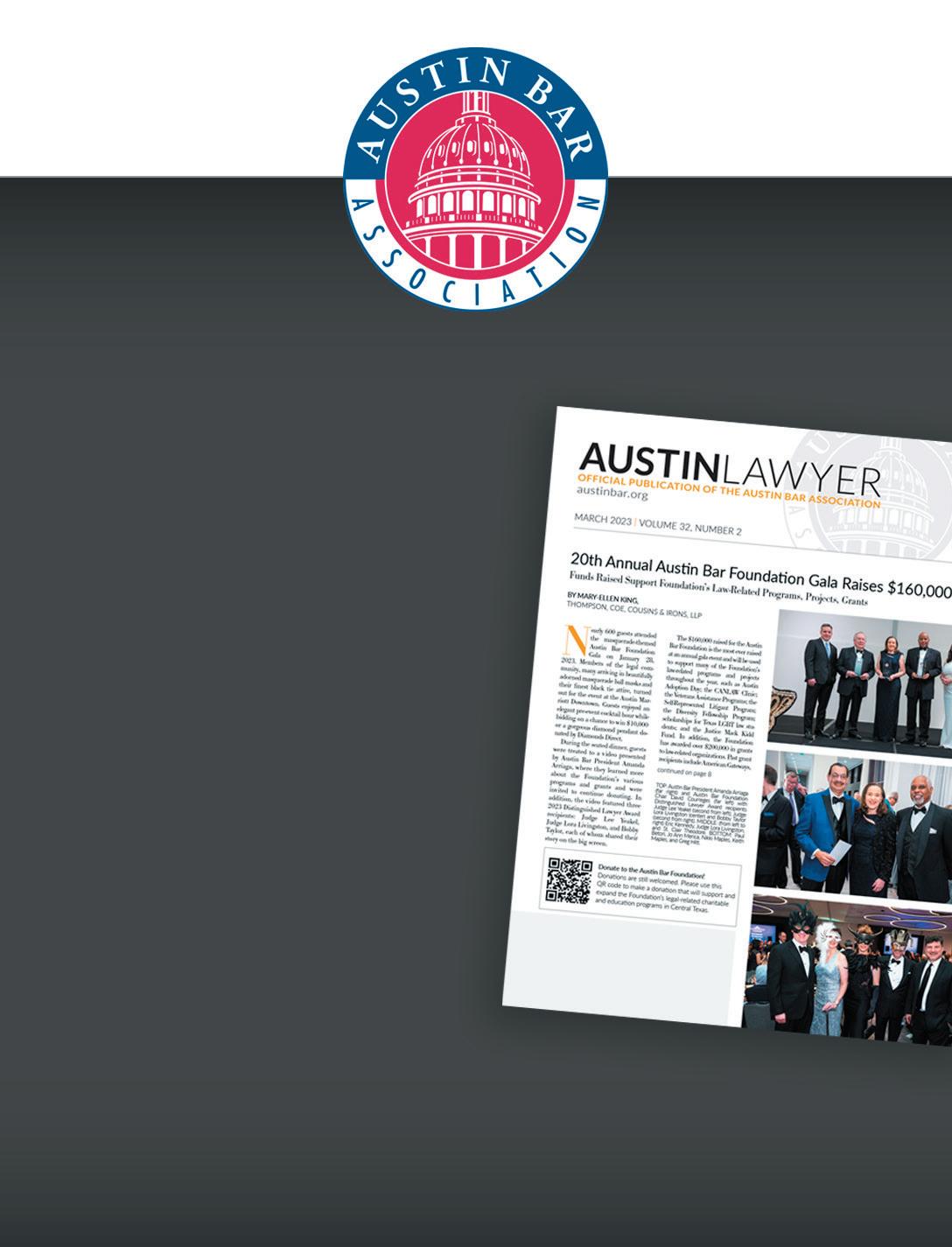
Barnett established a two-part inquiry for similar disputes: A plaintiff may satisfy her burden by showing that reassignment is reasonable on its face—ordinarily or in the run of cases. Failing that, the plaintiff must show that special circumstances nonetheless make reassignment reasonable in the plaintiff’s specific situation.
Since Barnett, the courts of appeals have split on whether the ADA requires employers to grant exceptions to their most-qualified-candidate policies.
The Fifth Circuit joined the Eighth and Eleventh in holding that reassignment is not reasonable on its face where an employer has an established policy of hiring the best candidates. The Fifth Circuit reasoned that Methodist’s disability-neutral policy was like the seniority system in Barnett because it stabilizes employee expectations. The Fifth Circuit found additional support in the business needs of a hospital, as hiring the best-qualified candidates advances the safety of hospital employees and the health of the patients and communities they serve.
Even so, the Fifth Circuit vacated summary judgment for Methodist and remanded because the district court failed to give the EEOC an opportunity to satisfy the alternative, case-specific inquiry Barnett requires.
VEXATIOUS LITIGANTS: Multiple frivolous lawsuits across jurisdictions plus a frivolous appeal result in pre-filing injunction effective throughout the Fifth Circuit.
Nix v. Major League Baseball, No. 22-20364, 2023 WL 2534977 (5th Cir. Mar. 16, 2023).
It is not often that an appellate court issues its own injunction. The Fifth Circuit did so here, enjoining Nix from filing any lawsuit or pleading against the defendants in any court within the jurisdiction of the Fifth Circuit without first obtaining the permission of the court in which he seeks to file.
Nix is a former pro baseball player whose defunct company sold and distributed natural animal substances until Major League Baseball began investigating the company for suspected sales of banned performance-enhancing drugs.
Nix responded with a campaign of lawsuits across multiple jurisdictions targeting MLB, its players’s association, their members and employees, and many other defendants.
Essentially, Nix alleges his company was unfairly targeted. Nix’s most recent lawsuit in the Southern District of Texas alleged RICO
violations, fraud, tortious interference, defamation, and other sources of liability.
Joining a host of other courts, the district court dismissed Nix’s claims and sanctioned him. The district court also enjoined Nix from suing certain defendants in the Southern District of Texas without permission.
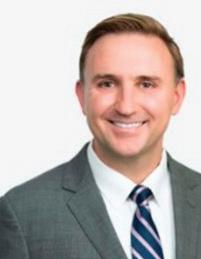
Nix appealed, but the Fifth Circuit concluded he did not raise a single colorable argument or explain any specific error. The defendants sought additional sanctions and injunctive relief, which the Fifth Circuit granted.
The Fifth Circuit explained that circuit courts have both the inherent and statutory authority to sanction parties through injunctions.
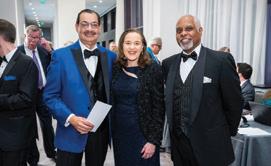
The Fifth Circuit concluded that Nix’s history of sanctionable conduct and demonstrated bad faith in this case justified a circuit-wide litigation injunction because they show “his commitment to continuing his moral crusade against the defendants.” AL

16 AUSTINLAWYER | MAY 2023
>
FEDERAL CIVIL COURT UPDATE
Jason LaFond is an Austin-based appellate litigator with significant experience before the Fifth Circuit. He is senior counsel at Yetter Coleman, LLP.
Have story ideas but don’t have time to write? Email Billy@AustinBar.org if you have a story idea you think is right for Austin Lawyer but aren’t able to write. » AustinBar.org austinbar.org MARCH 2023 | VOLUME 32, NUMBER 2 20th Annual Austin Bar Foundation Gala Raises $160,000 Funds Raised Support Foundation’s Law-Related Programs, Projects, Grants BY MARY-ELLEN KING, THOMPSON, COE, COUSINS & IRONS, LLP Nearly 600 guests attended the Austinmasquerade-themed Bar Foundation Gala on January 28, 2023. Members of the legal com- munity, many arriving in beautifully adorned masquerade ball masks and their finest black tie attire, turned out for the event at the Austin Mar- riott Downtown. Guests enjoyed anelegantpre-eventcocktailhourwhile bidding on a chance to win $10,000 or gorgeous diamond pendant do- nated by Diamonds Direct. During the seated dinner, guests were treated to a video presented by Austin Bar President Amanda Arriaga, where they learned more about the Foundation’s various programs and grants and were invited to continue donating. In addition, the video featured three 2023 Distinguished Lawyer Award recipients: Judge Lee Yeakel, Judge Lora Livingston, and Bobby Taylor, each of whom shared their story on the big screen. BarThe$160,000raisedfortheAustin Foundationisthemosteverraised toatanannualgalaeventandwillbeused support many of the Foundation’s law-related programs and projects throughout the year, such as Austin Adoption Day; the CANLAW Clinic; theVeteransAssistancePrograms;the Self-Represented Litigant Program; the Diversity Fellowship Program; scholarships for Texas LGBT law stu- dents; and the Justice Mack Kidd Fund. In addition, the Foundation has awarded over $200,000 in grants tolaw-relatedorganizations.Pastgrant recipientsincludeAmericanGateways, continued on page 8 TOP:Austin BarPresidentAmandaArriaga (far right) and Austin Bar Foundation Chair David Courreges (far left) with Distinguished Lawyer Award recipients Judge Lee Yeakel (second from left), Judge Lora Livingston (center) and Bobby Taylor (second from right). MIDDLE: (from left to right) Eric Kennedy, Judge Lora Livingston, St. Clair Theodore. BOTTOM: Paul Betori, Jo Ann Merica, Nikki Maples, Keith Maples, and Greg Hitt. Donate to the Austin Bar Foundation! Donations are still welcomed. Please use this QR code to make donation that will support and expand the Foundation’s legal-related charitable and education programs in Central Texas.
The following are summaries of selected civil opinions issued by the Third Court of Appeals during March 2023. The summaries are an overview; please review the entire opinions. Subsequent histories are current as of April 4, 2023.
APPELLATE JURISDICTION:
Court dismisses appeal, concluding severance order rendered prior order final. Karets v. Estate of Gumbs, No. 03-22-00035-CV (Tex. App.—Austin Mar. 10, 2023, no pet. h.) (mem. op.). In February 2021, the trial court signed an order denying Karets’s request for declaratory relief. In October 2021, the trial court signed a severance order, making the declaratory judgment final. Karets requested findings of fact. The trial
court then signed another order Dec. 9, 2021, that clarified that the February order was final and appealable. Karets filed her notice of appeal Jan. 20, 2022. The court of appeals concluded that the October order made the February order final and that the notice of appeal was due Jan. 3. The court rejected Karets’s position that finality language was necessary when the order disposed of all parties and issues. The court dismissed for lack of jurisdiction. The dissent would have used the Dec. 9 clarification order and held the notice of appeal was timely.
TRIAL PROCEDURE: Court reverses temporary injunction where trial court denied defendant opportunity to present evidence. Henric v. Glover, No. 03-22-00724-CV (Tex. App.—Austin Mar. 15, 2023, no pet. h.) (mem. op.). Glover sued Henric for breach of contract and sought injunctive relief. After granting a temporary restraining order, the trial court held a two-and-a-halfhour hearing on the temporary injunction. Near the end of the hearing, before Henric had put on his case, his attorney asked for additional time. The trial court denied the request, stated Glover had met his burden, and granted injunctive relief. The court of appeals held that the trial court abused its discretion. The court observed that Rule 681 requires a party be given an opportunity to be heard before injunctive relief can be granted. Here, the trial court deprived defendant of the right to present any evidence. The court further noted that dis -

cretion to limit time for hearings does not extend to denying a party an opportunity to put on a case in chief. The court vacated the injunction, reversed and remanded.
REAL PROPERTY: Court affirms HOA amendment prohibiting short-term rentals.
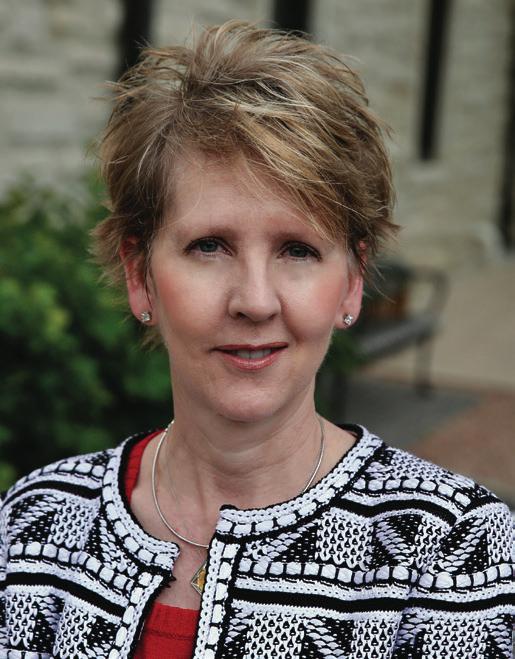
Angelwylde HOA, Inc. v. Fournier, No. 03-21-00269-CV (Tex. App.—Austin Mar. 17, 2023, no pet. h.) (mem. op.). Homeowners sued HOA after neighborhood governing documents were amended to require rental terms to be 12 months. Homeowners had been renting their properties for less-than-30-day terms. The trial court rendered judgment for homeowners, finding the amendments unenforceable. The court of appeals observed that when homeowners purchased their properties, the governing documents stated that they could be amended and that owners were bound by amendments. The original documents did not grant homeowners an absolute right to lease their residences. The court concluded that the homeowners could not reasonably have expected that there could never be restrictions on the right to lease. The court held that the amendments were valid and enforceable. The court reversed, rendered judgment, and remanded.
SANCTIONS: Court upholds monetary sanctions for post-judgment discovery conduct.
World Class Capital Group, LLF v. Gibson, Dunn & Crutcher LLP, No. 03-21-00360-CV (Tex.
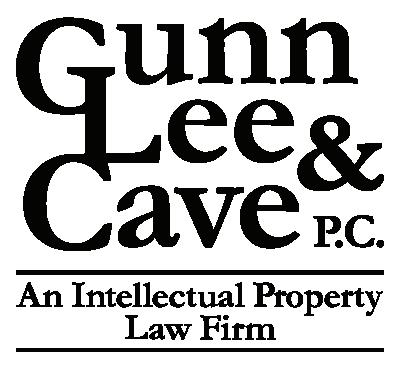
App.—Austin Mar. 30, 2023, no pet. h.) (mem. op.). Law firm obtained an almost $1 million judgment against appellants. During a post-judgment enforcement action, the trial court imposed monetary sanctions, including a per-day monetary sanction. The trial court subsequently increased the per-day sanction twice after appellants continued to fail to produce documents and appear for depositions. The court of appeals concluded that the post-judgment monetary sanctions were the only effective means to compel compliance. The court rejected appellants’ argument that the trial court did not consider lesser sanctions. The court held that the per-day sanction complied with TransAmerican.1 AL
FOOTNOTES
1 Transamerican Natural Gas Corp. v. Powell, 811 S.W.2d 913 (Tex. 1991).
> Robert L. McRae, Certified Mediator Registered Patent Attorney 8023 Vantage Drive, Ste 1500 San Antonio, Texas 78230 210-886-9500 Email: rmcrae@gunn-lee.com www.gunn-lee.com MAY 2023 | AUSTINLAWYER 17 THIRD COURT OF APPEALS CIVIL UPDATE
Laurie Ratliff is a former staff attorney for the Third Court of Appeals. She is board-certified in civil appellate law by the Texas Board of Legal Specialization and an owner at Laurie Ratliff LLC.
The following is a summary of a selected criminal opinion issued by the Third Court of Appeals from November 2022. The summary is an overview; please review the entire opinion. The subsequent history is current as of April 4, 2023.
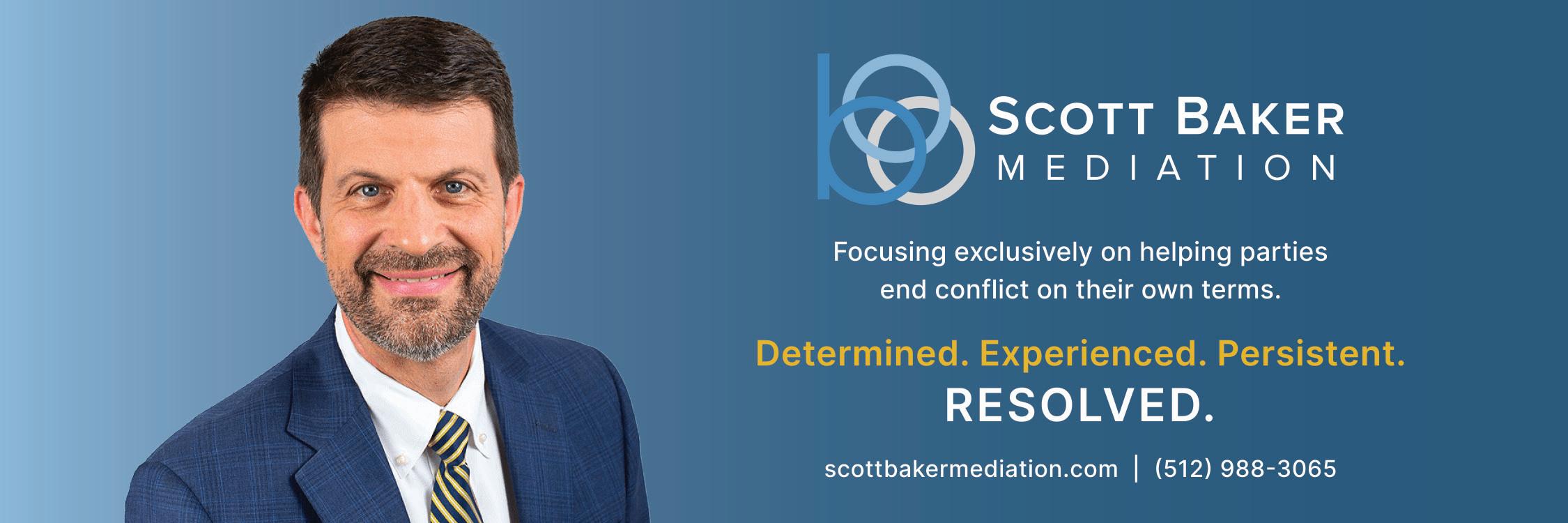
POLICE INTERROGATIONS –ADMISSIBILITY AND RE-INITIATION OF QUESTIONING:
Trial court properly suppressed statements of defendant who approached police, implicated himself in a crime, exercised his rights, and then made additional incriminating statements.
State v. Lovegrove, No. 0321-00530-CR (Tex. App.—Austin
Nov. 9, 2022, no pet. h.) (mem. op., not designated for publication). Lovegrove flagged down and walked up to a police officer and told him that he “got mixed up in some trouble,” wanted to go back home to Georgia, and wanted to check whether he was in “lawful trouble.” When the police officer asked what happened, Lovegrove told him that he “helped someone escape from their home,” specifically an underage girl. The officer was soon joined by another officer, and Lovegrove eventually made statements to the officers that led to his arrest for human trafficking.
Lovegrove later moved to suppress statements that he made after receiving Miranda warnings and invoking his right to remain silent and his right to counsel. Neither officer testified at the suppression hearing, and the only evidence admitted were video recordings from the body cameras worn by the officers on the date of Lovegrove’s arrest. The district court granted the motion to suppress, ultimately prohibiting the State “from introducing statements made by Lovegrove after he was placed in handcuffs.” More specifically, the district court suppressed two sets of statements: (1) those Lovegrove made after he was initially read his Miranda rights and before he invoked those rights and (2) those Lovegrove made after one of the officers explained the human trafficking charge and asked Lovegrove, “Anything you want to comment on or are you just gonna—?” The State appealed.
The appellate court first ad-
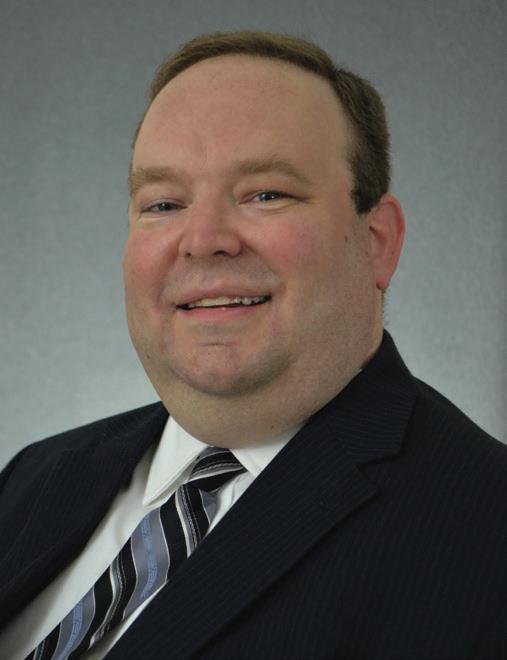
dressed the applicable standard of review. Although an appellate court may review de novo “indisputable visual evidence” contained in a videotape, it must defer to the trial judge’s factual finding on whether a witness saw what was depicted on a videotape or heard what was said during a recorded conversation. However, in this case, “where no witness testimony is presented at the suppression hearing, the custodial questioning was videotaped, and the underlying events are not in dispute, the trial court’s ruling is merely an application of the law to uncontested facts.” Thus, the appellate court’s review here was de novo.
The court next examined the first set of suppressed statements, those made before Lovegrove invoked his Miranda rights. Lovegrove argued that those statements were inadmissible because the officers intentionally used an impermissible “question first, warn later” technique. The court explained that “[t]he pivotal question in determining the admissibility of post-Miranda statements is whether the evidence shows that the officers deliberately employed a twostep, ‘question first, warn later’ interrogation technique to circumvent the suspect’s Miranda protections.”
Whether the strategy was deliberate hinges on the interrogating officer’s subjective intent, and the State has the “burden of disproving the deliberate employment of a two-step interrogation technique once a defendant objects to the admission of his statement on two-step interrogation grounds.” Here, the officers immediately
placed Lovegrove in handcuffs when they suspected that he was guilty of human trafficking, and “a couple of minutes after Lovegrove was handcuffed and while being questioned by” one of the officers, the other officer pulled out a Miranda warnings card, “indicating that he expected Miranda warnings were needed.” However, that officer “stood by as Lovegrove’s questioning proceeded and delayed providing the Miranda warnings to him.” The court concluded that the State did not meet its burden of disproving the deliberate employment of a two-step interrogation technique.
Finally, the court reviewed the second set of suppressed statements, those made after Lovegrove had exercised his right to remain silent. The video showed that one of the officers reinitiated the interrogation after Lovegrove had invoked his right to remain silent and the prior interrogation had ceased. That officer informed Lovegrove that he was to be charged with human trafficking. Lovegrove asked about the meaning of “trafficking,” and the officer summarized the offense. Lovegrove indicated that he “understood,” but “the conversation did not cease at that point.”
The officer further asked Lovegrove for his “comment” on the charges. The court concluded that this was “reasonably likely to elicit an incriminating response” and that the officer should have known that his question “was reasonably likely to have that effect.” Thus, both the first and second sets of statements were properly suppressed. AL
> 18 AUSTINLAWYER | MAY 2023
THIRD COURT OF APPEALS CRIMINAL UPDATE
Zak Hall is a staff attorney for the Third Court of Appeals. The summary below represents the views of the author alone and does not reflect the views of the court or any of the individual Justices on the court.
Look What’s Happening at Austin Bar Association’s Loving It Lawyers Club!
BY LAURA FOWLER, THE FOWLER LAW FIRM PC
Loving It Lawyers Club was thrilled to feature Hon. Lee Yeakel, U.S. district judge for the Western District of Texas—Austin Division, and Patrick Keel, former judge for the 345th Judicial District of Texas. In an evocative and thought-provoking presentation, both of these accomplished jurists shared what they still love about the practice of law, and what they wish they had known when they began.
Judge Yeakel and Judge Keel spoke to a full house of more than 50 at the first live meeting of Loving It Lawyers Club in more than three years.

A delicious buffet lunch was underwrittn by an anonymous donor of Loving It Lawyers Club, so all in attendance joyfully ate free of charge and earned an hour
of ethics and CLE.
If you are interested in participating in one of the most
exciting and innovative practice sections in Austin (and maybe the world), contact Loving It Lawyers
Club Founding Chair Laura Fowler at 512-441-1411 or go to austinbar.org. AL
Texas values. Global reach. Visit www.crowe.com/disclosure for more information about Crowe LLP, its subsidiaries, and Crowe Global. © 2022 Crowe LLP. MBV2301-001H Crowe is a public accounting, consulting, and technology firm with five offices in Texas. Our experienced teams – locally and around the world – provide a variety of services and solutions for legal departments and law firms. • Forensic accounting and litigation support
Business valuation
Family law forensic accounting
Digital forensics and incident response services
Legal management consulting Explore more on crowe.com.
•
•
•
•
MAY 2023 | AUSTINLAWYER 19
ABOVE (L-R): Hon. Lee Yeakel, Laura Fowler, and Hon. Patrick Keel. Judges Yeakel and Keel regaled attendees with valuable insights during the Loving It Lawyers Club’s recent meeting at The Austin Club.
Local Inn of Court Chapters Accepting Applications
The Austin chapters of the American Inns of Court are accepting applications for the 202223 term. The American Inns of Court are designed to improve the skills, professionalism, and ethics of the bench and bar. Information about the American Inns of Court can be found at www.innsofcourt. org. Each Inn meets monthly. The deadline to apply is May 31, 2023. Interested applicants should submit a letter of interest, a current resume, and two letters of recommendation to the membership chairs listed below.

Robert W. Calvert Inn of Court
The Robert W. Calvert Inn of Court—the first Inn established in Austin—has been awarded Platinum recognition by the American Inns of Court. Applications are welcome from any practicing attorney or judge in Travis and contiguous counties. Membership is open to all licensed Texas attorneys without regard to area of practice or trial experience. Contact matt@barnettgarcia. com or JHobbs@abaustin.com for more information.
Barbara Jordan Inn of Court
The Barbara Jordan Inn of Court is accepting applications from any practicing litigation attorney or judge from Travis and contiguous counties. Austin’s
newest Inn, it enjoys an enthusiastic and diverse community of members. The Inn strives to honor Barbara Jordan’s legacy of professionalism and integrity and has been awarded Platinum recognition by the American Inns of Court. Contact fditroia@bn-lawyers.com for more information.
Lloyd C. Lochridge Inn of Court
The Lloyd C. Lochridge American Inn of Court is dedicated to the promotion of excellence in professionalism, ethics, civility, and legal skills within the Austin litigation community. Applications are welcome from any practicing litigation attorney or judge. Membership is limited to the number of available openings. Contact christie.emh@ gmail.com for more information.
The Honorable Lee Yeakel Intellectual Property Inn of Court
The Honorable Lee Yeakel Intellectual Property Inn of Court focuses on intellectual property law. The Inn’s membership includes judges, judicial clerks, special masters, in-house counsel, litigators, IP prosecution attorneys, transactional attorneys, professors, and law students. The Yeakel IP Inn accepts membership applications during the entire month of May each year. Information on applying is available at https://inns.innsofcourt.
org/for-members/inns/the-honorable-lee-yeakel-intellectual-property-american-inn-of-court/application-information/.
Larry E. Kelly American Bankruptcy Inn of Court
The Larry E. Kelly American Bankruptcy Inn of Court is an organization of judges, lawyers, legal educators, and law students dedicated to promoting excellence in legal advocacy in all areas of bankruptcy practice. The LEK Inn has been awarded Platinum recognition by the American Inns of Court. Membership is available
to practicing attorneys, bankruptcy judges, their law clerks, and law students interested in the practice of bankruptcy law. For more information about the LEK Inn and admission applications, contact LEK Inn Membership Chair Leslie Luttrell at luttrell@ lclawgroup.net. AL

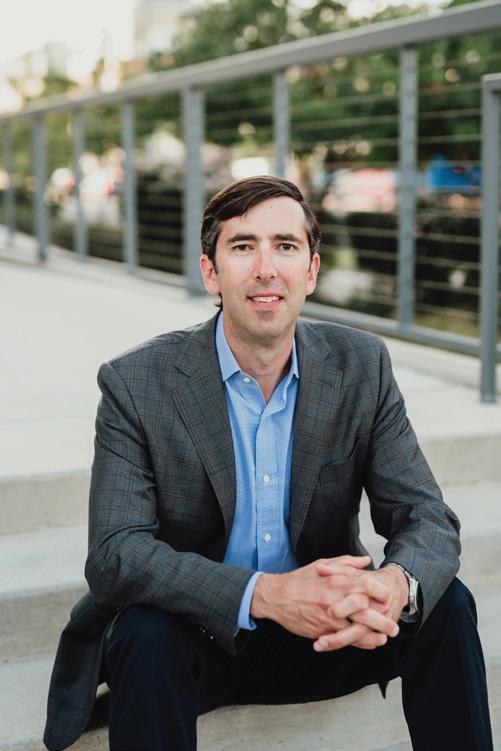
20 AUSTINLAWYER | MAY 2023
You’re busy looking out for your clients’ needs. Who’s looking out for yours? Jim Kaighin, Jr., CFP Financial Professional ® 3305 Northland Dr., Suite 414 Austin, TX 78731 512-302-6051 kaighinjr@momentumin.com Member: FINRA/SIPC
2024 SCHEDULE
Travis County Civil District Courts
Holidays
January 1: New Year’s Day Observed
January 15: MLK Day
February 19: President’s Day
May 27: Memorial Day
June 19: Emancipation Day
July 4: Independence Day
September 2: Labor Day
November 11: Veterans Day
November 28-29: Thanksgiving
December 24-25: Christmas Observance
REGULARLY SCHEDULED DOCKETS WILL NOT OCCUR THE WEEKS OF:
March 11 - March 15, Settlement Week
September 3 - September 6, Settlement Week
CIVIL CASE SETTING INFORMATION
To set civil cases online go to https://www.traviscourtsapplications.org/portal To obtain information, contact: Court Administrator’s Office, P.O. Box 1748, Austin, Texas 78767 Phone: (512) 854-2484 (Option Zero) http://www.traviscountytx.gov/courts
MAY 2023 | AUSTINLAWYER 21
Honorable Amy Clark Meachum, Local Administrative Judge
January 1 Non-Jury 8 Jury 15 Non-Jury 22 Jury 29 Non-Jury February 5 Jury 12 Non-Jury 19 Non-Jury 26 Jury March 4 Non-jury 11 Settlement Week 18 Jury 25 Non-Jury April 1 Jury 8 Non-Jury 15 Jury 22 Non-Jury 29 Jury May 6 Non-Jury 13 Jury 20 Non-Jury 27 Non-Jury June 3 Jury 10 Non-Jury 17 Non-Jury 24 Jury July 1 Non-Jury 8 Jury 15 Non-Jury 22 Jury 29 Non-Jury August 5 Jury 12 Non-Jury 19 Jury 26 Non-Jury September 2 Settlement Week 9 Jury 16 Non-Jury 23 Jury 30 Non-Jury October 7 Jury 14 Non-Jury 21 Jury 28 Non-Jury November 4 Jury 11 Non-Jury 18 Jury 25 Non-Jury December 2 Non-Jury 9 Jury 16 Non-Jury 23 Non-Jury 30 Non-Jury
Warren Vavra, Court Administrator
Austin Bar Celebrates 2023 Law Day Contest Winners
Two of the winners in the State Bar of Texas’s 2023 Law Day contests were submitted by the Austin Bar Association.
The Austin Bar previously held its own Law Day contests on March 24, and subsequently submitted its first-place winners to the State Bar’s contest.
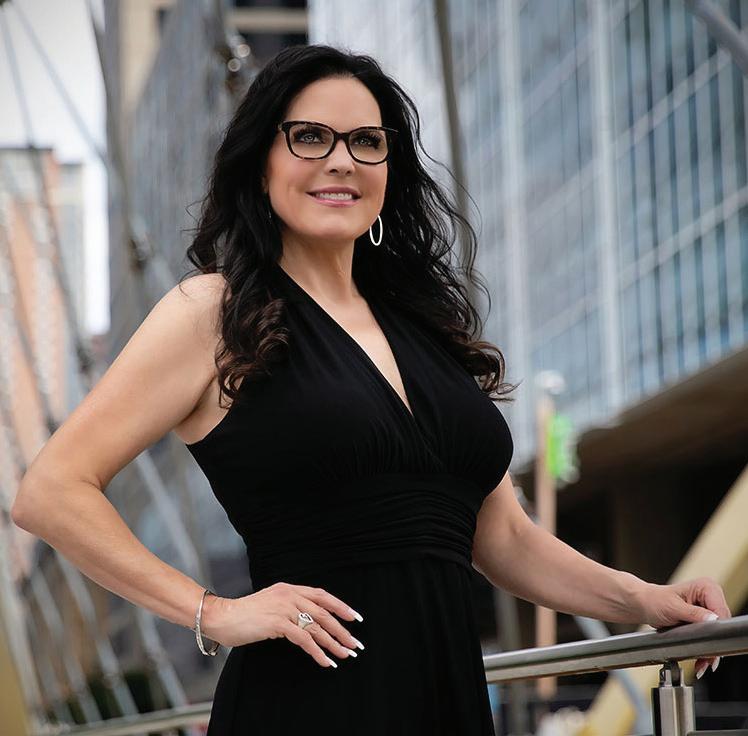
The theme of the contests was the American Bar Association’s theme for Law Day 2023: “Cornerstones of Democracy: Civics, Civility, and Collaboration.”

The students were asked to explain or depict how civics, civility, and collaboration could help society improve public discourse and inspire greater understanding of the Constitution and American government.
The first-place winner of the Austin Bar’s photography contest was Skylar Hawn, a senior at Akins High School, with his piece, “We the People, Hand in Hand.”

Skylar won third place in the State Bar’s photography contest.
The first-place winner of the Austin Bar’s poster contest was Luke Hoffman, a fourth grader at Highland Park Elementary School, with his poster, “Missing Pieces.”

Luke won third place in the State Bar’s poster contest.
Lukas Cardenas, a senior at Akins High School, won first
place in the Austin Bar’s essay contest with his essay, “The Marble and the Sculptors” featured on the facing page.
Armin Salek, co-chair of the Austin Bar’s Law-Related Education Committee, presented the awards to the students.
In addition to participating in the contests, Austin-area students also toured The University of Texas School of Law.
After the winners received their prizes, Judge Karin Crump shared her journey from aspiring first-generation lawyer to the bench.
The students then toured the
campus en route to a networking lunch with members of the local judiciary, including Hon. Jan Soifer, 345th Judicial District Court; Hon. Jessica Mangrum, 200th Judicial District Court; Hon. Selena Alvarenga, 460th Judicial District Court; Hon. Bianca Garcia, County Court at Law #3; Hon. Raul Gonzalez, Travis County Justice of the Peace Precinct 4; and Hon. Judge Karin Crump, 250th Judicial District Court.
After lunch, students participated in an advocacy lesson taught by The University of Texas Board of Advocates, which was
followed by a keynote presentation from Samantha McCoy, who discussed her work advocating for survivors of violence at the state, federal, and international levels.
To make sure the students left knowing there was support if they were interested in pursuing legal careers, AccessLex and the Youth Justice Alliance shared financial resources, scholarship opportunities, and a program to help them find their dream law school. AL
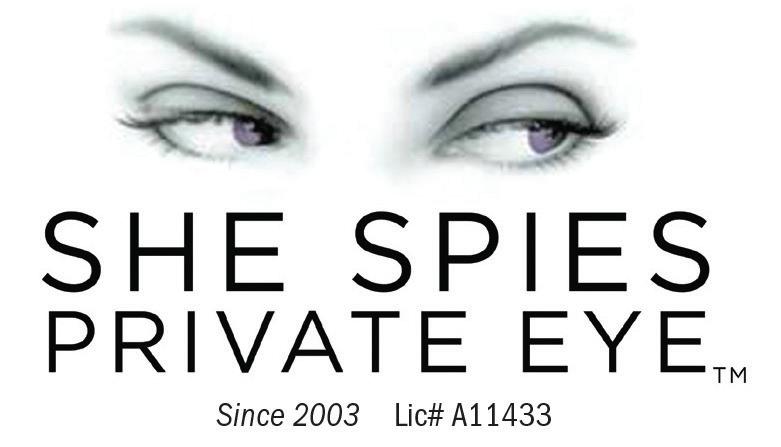
22 AUSTINLAWYER | MAY 2023
LEFT: Luke Hoffman, a fourth grader at Highland Park Elementary, won first place in the Austin Bar’s poster contest and third place in the State Bar’s contest with this entry, titled “Missing Pieces.”
Divorce and Child Custody Surveillance ~ Undercover Background Checks Computer & Phone Forensics Corporate Investigations Expert Testimony and more Offices in Austin, Round Rock and Dallas STRICTLY CONFIDENTIAL Featured in Forbes Magazine
RIGHT: Skylar Hawn, a senior at Akins High School, won first place in the Austin Bar’s poster contest and third place in the State Bar’s contest with his piece, “We the People, Hand in Hand.”
“Information is power, the not knowing is devastating.”
Anji Maddox
The Marble and the Sculptor
BY LUKAS CARDENAS, AKINS HIGH SCHOOL
Editor’s Note:
Lukas Cardenas won the Austin Bar Association’s 2023 Law Day Essay contest with this submission.
The human condition is wrought with the endless struggle to pursue one’s desires. Each day, we are faced with the battle between what we want, and what is right. Some days, we find ourselves selfish, recklessly deciding what we want is most important. Others, we find ourselves selfless, devoted to the betterment of ourselves, our loved ones, and humanity. As we ponder the end of our struggle, we are forced to wonder what will define us when all is said and done. Is it the days we were selfless? The days we were selfish? Or is it our will to be the former, our unrelenting determination to keep trying?
In America, we find ourselves locked in a parallel struggle between the desires of the few and the betterment of the many. What defines us as a country will not be the sum of the decisions we make, but of the collaboration that we have shown in pursuit of them. Civility is the way our democracy prospers, and through open discussion, justice, and respect, our country will continue to prosper.
Our founders warned against the gridlocks that we find ourselves in today. George Washington said that although political parties may serve the result we desire for a short period, they will inevitably become tools by which “unprincipled men will be enabled to subvert the power of the people and usurp for themselves the reins of government, destroying afterwards the very engines which have lifted them to unjust dominion.”
Despite the misgivings of Washington and others, we subjected ourselves to what they predicted would make way for injustice. How, then, can we prevent such injustice? The only way is to acknowledge it. Discourse is the best way—the only way—to learn from
others. In our country, there is a stark and serious discrepancy between those of us who know our Constitution and the government, and those who do not. Those who do run the country, making and enforcing laws the way they see fit, whether that be according to their self-interest or not. The truth is, the majority of the country may never know the difference.
We fix the problems in our
country by collaborating on them. Lack of education in America of its systems has caused a chronic gap in understanding by its people. When we put aside our personal desires in favor of the betterment of the whole, we devote ourselves to civility, we reach true discourse, followed by full political participation.

We cannot expect our population to meet our expectations of democ-
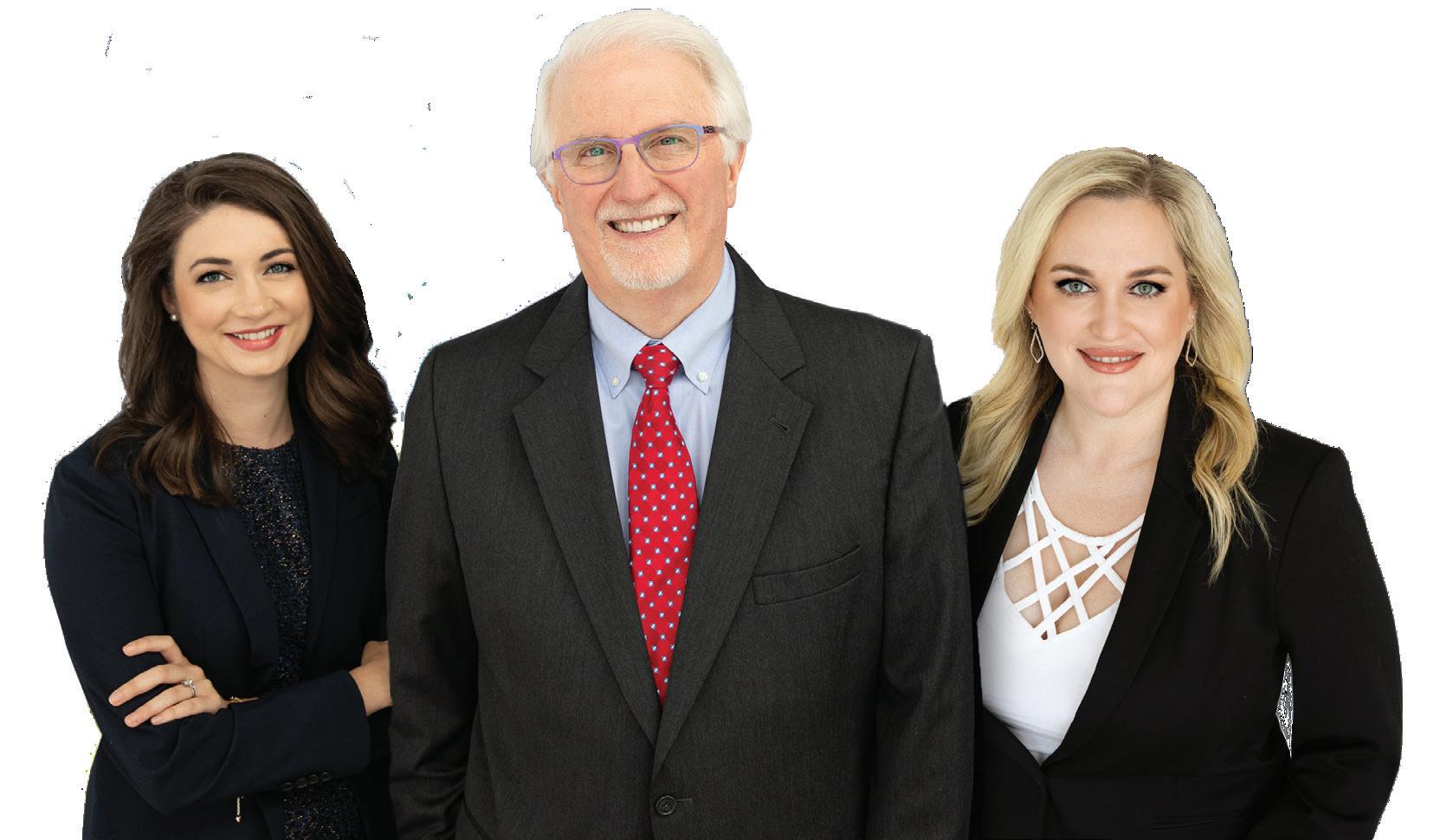
racy if we cannot also educate them on its workings. We must encourage debate in our political systems, not halt it when it doesn’t fit our own ideals. We will not be judged by our bad and good days combined; we will be judged by our commitment to prosper by what is right.
Let us be remembered as the nation that ended its people’s ignorance of its politics, not the nation that took advantage of it. AL
MAY 2023 | AUSTINLAWYER 23
We’re Here. We’re Open. We’re Ready to Help. Video Conferencing and In-person Social Distancing Now Available FAMILY LAW Divorce Custody Same-Sex Marriage Appeals Modifications A Client-Centered Approach to Family Law
understand. We can help. LAW FIRM, P.C. Mediations Arbitrations
We
Attorney Jimmy Vaught, Board-Certified in Family Law and Civil Appellate Law by the Texas Board of Legal Specialization
AustinDivorceLawyer.com 512.605.0999
Attorney Jillian French Board-Certified in Family Law by the Texas Board of Legal Specialization
Attorney Erin Leake Board-Certified in Family Law by the Texas Board of Legal Specialization
Austin Bar Starts Podcast on Diversity, Equity, Inclusion
Podcast Highlights Value of Diversity in Legal Leadership Positions
The Austin Bar Association was awarded a $15,000 grant from the Texas Bar Foundation to start a podcast dedicated to highlighting the value of diversity in leadership positions in the Austin legal community.
Highlighting diversity, equity, and inclusion in the legal community has been a core issue for Amanda Arriaga, president of the Austin Bar Association for 2022-23.
“Since 1893, the Austin Bar Association has only had 14 female presidents and eight minority presidents,” she said. “Of the eight minorities, only three were female.”
Arriaga is the first Hispanic female president of the Austin Bar.
When Arriaga discovered this fact, her “Council of Firsts” initiative was born.
During her time as president, Arriaga has sought to put inclusion at the forefront by offering DEI training to the board and ensuring good governance by utilizing the Equitable and Inclusive Vendor Policy year-round for all contracts over $1,000.
The Council of Firsts podcast is another step toward making the Austin Bar Association a more inclusive and equitable organization.

“This podcast is meant to discuss the need for diversity in legal leadership positions, and spans beyond the Austin Bar Associa-
tion to feature the important firsts in the Austin legal community,” she said.
The podcast premiered on April 18, 2023, and featured Velva Price, the Austin Bar’s first African American female president who currently serves as District Clerk for Travis County.
The second episode, which premiered on April 25, featured Richard Pena, the first Hispanic president of the Austin Bar and the first Hispanic president of the State Bar of Texas.
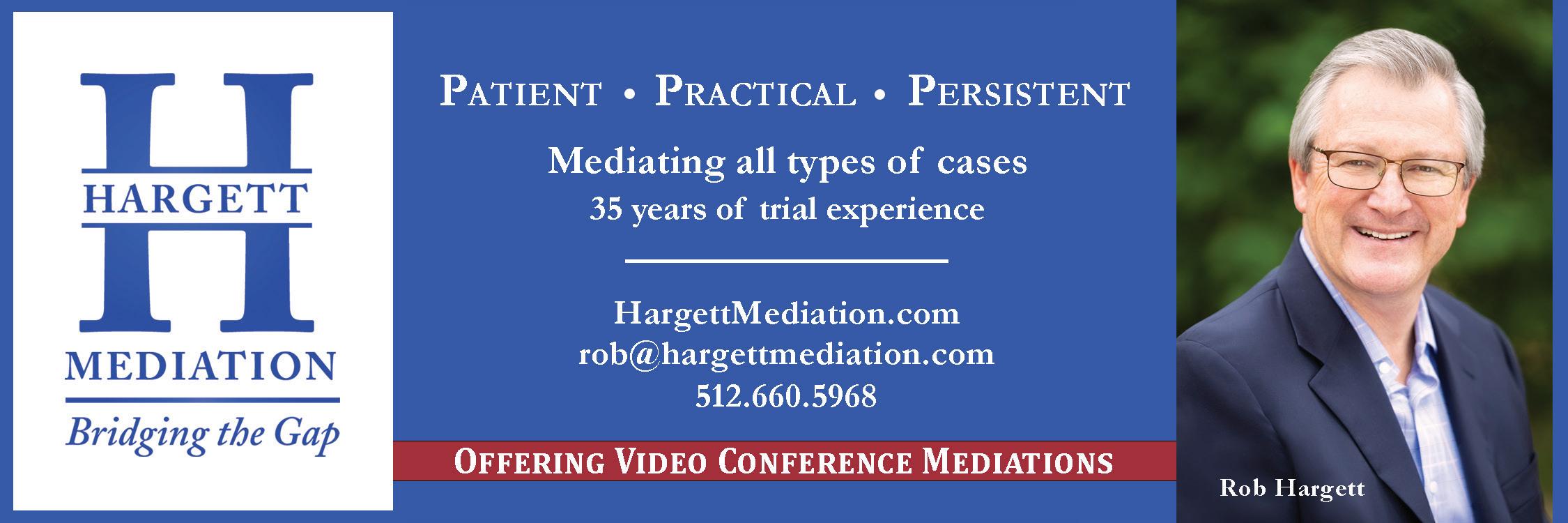
Future episodes will feature Betty Balli Torres, the current executive director of the Texas Access to Justice Foundation, who was also the first Latina executive director of that organization and the first Latina to receive the Distinguished Lawyer Award

from the Austin Bar Foundation; Gary Schumann, founder of the LGBT Bar Association and current chair of the Austin LGBT Chamber of Commerce; Gisela Triana, the first Latina justice of the Third Court of Appeals; and Caroline Hall, president of the Travis County Women Lawyers’ Association.
The Council of Firsts podcast is available on Apple Podcasts, Spotify, YouTube, and all other
podcasting platforms.
Since its inception in 1965, the Texas Bar Foundation has awarded more than $24 million in grants to law-related programs. Supported by members of the State Bar of Texas, the Texas Bar Foundation is the nation’s largest charitably-funded bar foundation. AL
2022-23 Austin Bar Association President Amanda Arriaga
24 AUSTINLAWYER | MAY 2023
Council of Firsts is available on Apple Podcasts, Spotify, YouTube, and all other podcasting platforms.
Fifth Circuit Adopts Rule Change


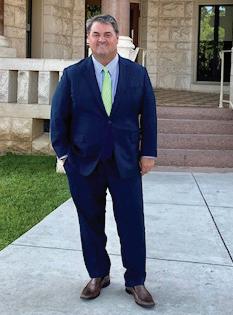
Amended Rule 35.6 Affects En Banc Procedures


The U.S. Court of Appeals for the Fifth Circuit has adopted a change to its Rule 35.6. The amended rule went into effect on April 3, 2023.
The text of the rule as amended reads as follows:
35.6 Determination of Causes En Banc and Composition of En Banc Court. A cause will be heard or reheard en banc when it meets the criteria for en banc set out in Fed. R. App. P. 35(a). The en banc court will be composed of all active judges of the court. Any senior circuit judge of this circuit shall be eligible (1) to participate, at his or her election and upon designation and assignment pursuant to 28 U.S.C. § 294(c) and the rules of this court, as a member of an en banc court re -
viewing a decision of a panel of which such judge was a member, or (2) to continue to participate in the decision of a case or controversy that was heard or reheard by the court en banc at a time when such judge was in regular active service. An election to participate is to be communicated timely to the chief judge and clerk.
The section previously read:1 35.6 Determination of Causes En Banc and Composition of En Banc Court. A cause will be heard or reheard en banc when it meets the criteria for en banc set out in FED. R. APP. P. 35(a). The en banc court will be composed of all active judges of the court plus any senior judge of the court who participated in the panel decision who elects to participate in the en banc consideration. Any senior circuit
judge of this circuit shall be eligible (1) to participate, at his or her election and upon designation and assignment pursuant to 28 U.S.C. § 294(c) and the rules of this court, as a member of an en banc court reviewing a decision of a panel of which such judge was a member, or (2) to continue to participate in the decision of a case or controversy that was heard or reheard by the
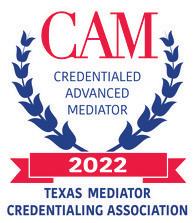
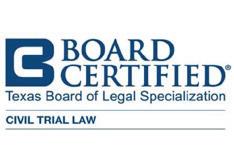
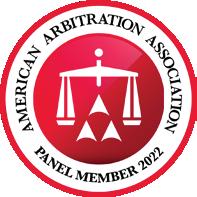
court en banc at a time when such judge was in regular active service. An election to participate is to be communicated timely to the chief judge and clerk. AL
FOOTNOTES
1 The portion of the rule affected by the amendment has been highlighted (in italics) by Austin Lawyer editors for readers’ convenience.


Me di a tor, Arbi t ra tor, Spe ci a l J udge a nd Li t i ga t i on Consult a nt
Mediation • Arbitration • Litigation Consulting Special Master/Judge Proceedings JEFF ROSE RoseResolutionGroup.com jeff@roseresolutiongroup.com 512.637.0931 Mediation. Arbitration. Resolution. Senior Judge Former District Judge and Chief Justice - Texas Third Court of Appeals MAY 2023 | AUSTINLAWYER 25
Senior District Judge Stephen Yelenosky
Meet Austin Lawyer’s New Managing Editor, Billy Huntsman

Huntsman Has Been Hired as Austin Bar’s New Communications and Membership Development Director
Q&A WITH BILLY HUNTSMAN
Rachael Jones, editor-in-chief of Austin Lawyer, sat down with Billy Huntsman for a quick Q&A as Huntsman begins his journey with the Austin Bar Association as communications and membership development director.
AUSTIN BAR: You must have some great stories from being a journalist. What are some memorable moments?
whenever I’d hear someone say, “You gotta network!” But to be an effective attorney—and to be a healthy attorney—you do have to network. The Austin Bar is invaluable for the networking opportunities it provides. All you as a member have to do is take advantage of those opportunities.
AUSTIN BAR: What are some goals for the Bar as a whole for helping to support lawyers?
Hi, I’m Billy Huntsman. I’m the new communications and membership development director at the Austin Bar. I’ll also be the new managing editor for Austin Lawyer. I don’t like talking about myself, but for the sake of familiarizing myself to you, I will.
I’m originally from Albuquerque, N.M. and lived there until I moved to Las Cruces. I lived there for six years, majoring in journalism at New Mexico State University. Why no one held an intervention for me to ask the question, “Why are you majoring in a dying industry?” I don’t know.
Nonetheless, journalism allowed me to pursue my passion, which is telling stories. Stories are at the heart of any successful organization. Stories are the protein— without protein, an organization, the body, dies.
In my role at Austin Bar, I have two main responsibilities: telling the stories of the association and creating value for our membership. These responsibilities go well together.
How can we recruit new members without telling the stories of our current members?
How can we retain members?
How can we get more attendees to our CLE events?
The answer to these questions is: We can’t, unless we tell the stories of the Austin Bar.
But in order to tell our stories, I need your help.
I’m not a lawyer, nor am I omnipresent, omniscient, or omnip-
HUNTSMAN: I covered all sorts of stories and have the burden of a good memory to remember them, particularly how boring city council and county commissioner meetings are. My favorite story, though, had to do with monks coming to a vineyard in Las Cruces to pick grapes for the vintner. The vintner didn’t have enough workers, so the monks offered to do it if the vintner would give them some of the wine. I arrived at the vineyard before the break of dawn and was there when the monks came. I interviewed a few of them as they were picking grapes, and I remember how content they were. They didn’t talk a lot at the monastery, but in the rows they were very vocal and goading each other on.
AUSTIN BAR: What are some of your goals as the new communications and membership development director?
HUNTSMAN: My main goal is to tell the stories the Austin Bar has. If we do that well and if we do that enough, the message of how great Austin Bar is will get out there. As newer generations enter the legal profession, there’s a trend to isolate, instead of network. I understand that to an extent: I’m a younger person, and I used to roll my eyes
otent. There are stories in the Austin Bar I will never hear about on my own, or that I won’t be able to understand the magnitude of.
That’s where you come in. You can tell the stories of the Austin Bar yourself.
Now you may be thinking to yourself, “Well, I’m not really a writer, I don’t even like writing briefs.” Or, “Well, I’d love to write about this or that, but I’m just swamped with my caseload, I don’t have the time.”
That’s fine, that’s where I come in.
Email me at billy@austinbar.org or call me at 512-472-0279 x107,
HUNTSMAN: We’re always looking for ways to provide support and value for our members. We know one of the biggest challenges our sections have right now is the lack of free or low-cost space to host CLEs. In a couple of months, we’re excited to be able to offer our on-site conference room, which sections can use to host CLEs. We also just launched a free app, which you can download on the App Store and the Google Play Store. You can manage your memberships on it and view digital copies of CLE materials on it. Soon, you’ll also start getting jury trial update notifications through the app, so make sure you have notifications turned on for it in your settings.
AUSTIN BAR: Do you need attorneys to submit articles and content for the monthly magazine or website?
HUNTSMAN: Absolutely. This isn’t “our” magazine, this is your magazine. Is there something you’d like to see in the magazine? Write it up and send it to us—or tell us about it and we can find someone to write about it. Is there a topic you think is worth covering month-to-month? Suggest it to us. We want this magazine to be as valuable to you as possible, just as we want Austin Bar to be as valuable to you as possible. AL
and we can discuss your idea.
Maybe you don’t know where to start—I can help you narrow down to the protein of your story.
Maybe you don’t have the time—give me the broad strokes of the story. I’ll get a draft to you to look over and add any missing details. Frankly, it’s easier to be an editor than a writer.
Or maybe you don’t have story ideas, but you’re really impressed with some colleagues and want other lawyers to hear about some of their recent accomplishments. Send me the kudos you want to put out there, and I’ll make sure all our membership sees it in Austin Lawyer.
I’ll finish this article by quoting a question Austin Bar President Amanda Arriaga recently posed to our section chairs at a board meeting: “Are you getting what you need from the Austin Bar?”
If the answer is “No” in any regard, please reach out to us.
In the short time that I’ve been here, I’ve seen the dedication and approachability of all the staff. I promise I’m the same way.
We all want to help you succeed individually, and also want the Austin Bar to succeed.
We can accomplish both of these goals by collectively telling stories. AL
26 AUSTINLAWYER | MAY 2023
continued from page 1
2. The law is not hypothetical. Do you remember law school hypotheticals? They often took more twists and turns than a carnival mirror maze. Now, certainly law school hypotheticals have their time and place, but they may give some young attorneys the impression that the law is an esoteric, ephemeral, distant force that only affects people in a detached and abstract way. Nothing could be further from the truth. The law very often has a real and immediate impact on the lives of our clients, their loved ones, and everyone associated with the lawsuit. It is vital for all attorneys, but especially young attorneys, to always remember that our actions as lawyers have a real and sometimes dramatic effect. The law has consequences, and it is part of our obligation as attorneys to be cognizant of those consequences and to inform our clients about the likely legal outcome of the actions we take on their behalf.
3. Find the opportunity in each mistake.
Mistakes happen in the practice of law. I doubt an attorney exists who could claim, honestly, to have never made a mistake. But in law school, mistakes were to be avoided. I remember, during the dreaded round of cold calls, being terrified that I would say something ignorant, something my fellow law students would find laughable, or something the professor would find objectionable. And of course, on exams, the goal was to make as few mistakes as possible to keep ahead of the curve. But mistakes happen! And law schools do a relatively poor job of preparing us for how to deal with them. When mistakes happen, the most important thing is to take ownership of the mistake. You are a human, and humans make mistakes. It is okay to get it wrong sometimes. Do not go blaming your paralegal, or litigation assistant, or your client–even if a mistake can fairly be attributed to one of those individuals, you are the attorney and the buck stops with you. Mistakes, when they occur, need to be addressed,
and quickly. Inform the client of the mistake, inform the court, inform opposing party, and work to correct the error. And always remember that every mistake is an opportunity to learn, and above all an opportunity never to make that same mistake again.
4. Take time for yourself.

So many of my law school colleagues embraced the grind mindset, where working long hours assumed a virtue above and beyond any results that those long hours of study achieved. At times it seemed like a competition, with whoever could stand the most all-nighters with their nose buried in a torts textbook winning some
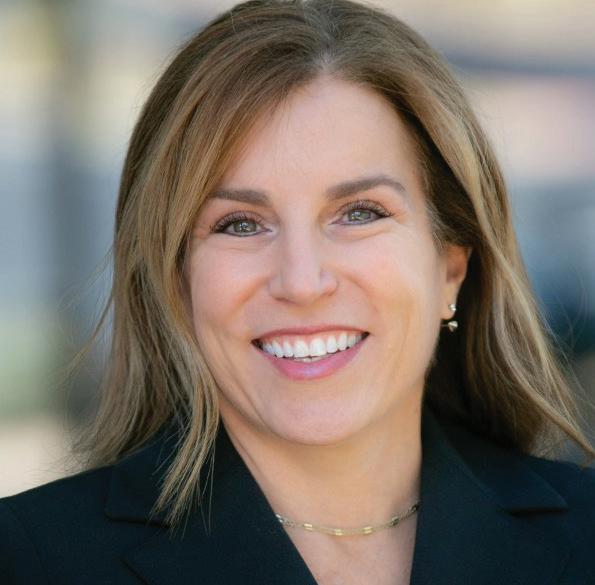
perverse prize. But embracing that same grind mentality in your practice is a sure way to burn out. You will exhaust yourself, and ultimately be less effective in everything you attempt. Take time for yourself. Go on a vacation, if doing so is financially feasible. And if a vacation is not in the cards, take a day off and go for a hike, or pursue a hobby you have neglect-
ed. Carve out time for yourself that is separate from the practice of law. Doing so will ultimately prolong your practice and make you a more effective attorney.
To conclude, I’ll toss the premise of this article back at my readers. What are some things you have learned, throughout your practice, that they did not teach you in law school? AL
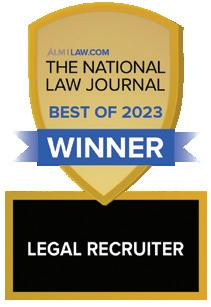
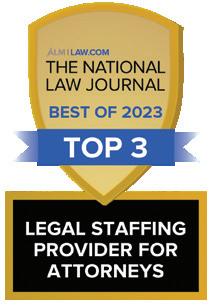
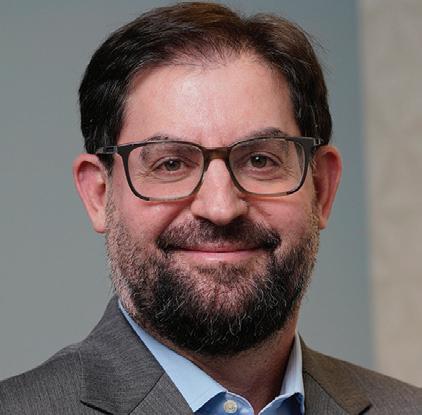

PEER-LEVEL CONTRACT ATTORNEYS & PARALEGALS Expertly matched to your needs and culture Jeremy Thompson Director, Legal Recruiting & Placement jthompson@latitudelegal.com Lauren Sheinberg Director, Legal Recruiting & Placement lsheinberg@latitudelegal.com Jeff Lilly Partner, Client Services jlilly@latitudelegal.com 512-956-8980 | LATITUDELEGAL.COM • Experienced legal talent for when quality matters • Peer-to-peer client service experience • Cost-efficient & flexible solutions • Contract engagements, contract-to-hire & permanent placement Flexible legal talent is closer than you think. CONTACT US TODAY.
MAY 2023 | AUSTINLAWYER 27
The law very often has a real and immediate impact on the lives of our clients, their loved ones, and everyone associated with the lawsuit.

WEALTH & PRIVATE BANKING Private Banking with Customized Lending Solutions1 As a Private Banking client, you will have access to various lending options customized to your needs to help you achieve your personal and business financial goals. Your dedicated Private Banker will work with you to create solutions, including terms and rates, that allow you to maximize liquidity and investment objectives. We offer a wide array of solutions including: • Revolving Lines of Credit • Professional Investment Loans • Professional Mortgage Loans • Luxury Vehicle Loans Experience premium modern banking with Broadway Bank. broadway.bank/private • (512) 465-6564 1 To be eligible, you must qualify to be a Broadway Bank Private Banking client. Membership qualifications apply for certain programs. All loans subject to credit and collateral approval (if applicable). Programs, interest rates, terms and conditions are subject to change without notice. Other restrictions and limitations may apply. Member FDIC. Rev. 04/23 #1081234997























 Mark Pryor
Rick Cofer
Jaynie Badgett
Liz Duggan
Ramey Ko
Jeffrey Connelly
Mark Pryor
Rick Cofer
Jaynie Badgett
Liz Duggan
Ramey Ko
Jeffrey Connelly




























 BY WAYNE SCHIESS, TEXAS LAW, LEGALWRITING.NET
BY WAYNE SCHIESS, TEXAS LAW, LEGALWRITING.NET


 Arielle Rosvall, Coleen Kinsler
Arielle Rosvall, Coleen Kinsler


























































